Alabama -- duh.
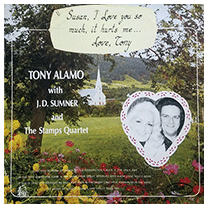 Tony Alamo "Susan, I Love You So Much, It Hurts Me... Love, Tony" (Alamo Records, 197-?).(LP)
Tony Alamo "Susan, I Love You So Much, It Hurts Me... Love, Tony" (Alamo Records, 197-?).(LP)
(Produced by Susan Alamo & Don Davis)
Here's a weird one... At least, one with a weird history. Tony and Susan Alamo were Pentecostal evangelicals whose born-again ministry devolved over the years into a full-blown cult, part of which involved polygamy, and more disturbingly, Mr. Alamo "marrying" underage girls and imprisoning them on a compound in Arkansas. Starting out in Los Angeles as "Jesus freaks" in the late 'Sixties, the Alamos were only moderately weird up until Mrs. Alamo died in 1982, and then Mr. Alamo really went off the rails and his behavior became more extreme and more grotesque. He was eventually arrested in the early 1990s and convicted for tax evasion and child molestation, later dying in federal prison in 2017. This was, I think, the first full album, with Tony Alamo backed by one of the most venerable southern gospel groups, J. D. Sumner & The Stamps. This is almost entirely a gospel album, although the "title track" is a cover of the Floyd Tillman oldie, "I Love You So Much It Hurts Me," a secular love ballad that dates back to the late 1940s. No date on this disc, though Alamo also covers Gene McClellan's pop-gospel crossover hit, "Put Your Hand In The Hand" (first recorded by Anne Murray in 1970, but best known as a top ten 1971 single for the band Ocean) which at least puts us in the right decade. This was probably recorded not long after they set up their Los Angeles-based church in 1969, though it appears to have been recorded in Nashville, as were their other albums.
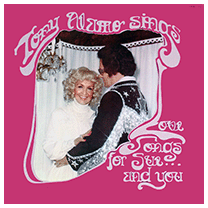 Tony Alamo "...Sings Love Songs For Sue... And You" (Alamo Records, 197-?).(LP)
Tony Alamo "...Sings Love Songs For Sue... And You" (Alamo Records, 197-?).(LP)
(Produced by Porter Wagoner, Tom Pick & Roy Shockley)
Weird album title and a definitely weird, Jim Jones-ish vibe to the album photos, especially his big, black aviator-frame shades. Knowing now what we didn't then... Ew. He's backed here by a Nashville crew that included with Dave Kirby (guitar), Alford Newell (guitar), Mike Leech (bass), Bobby Dyson (bass), Stu Basore (steel guitar), Hargus Robbins (keyboards), James Isbell (drums), Benny Kennerson (keyboards), Mike Lawler (keyboards), Terry McMillan (drums and harmonica), and backing vocals from the Sound 70s Singers... And, of course, the patronage of hick music legend Porter Wagoner, who seems to have fallen under Alamo's spell sometime int he 'Seventies.
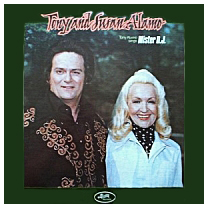 Tony & Susan Alamo "Mister DJ" (Alamo Records, 1977).(LP)
Tony & Susan Alamo "Mister DJ" (Alamo Records, 1977).(LP)
(Produced by Dan Hoffman)
Despite this checkered history, this late-'70s album is actually fairly good in musical terms. The cover art shows them onstage with Porter Wagoner at the Opry, and that got my attention. Wagoner wrote a testimonial for them in the liner notes, and if Porter liked 'em and even sang on their record, I figured I oughta at least check them out. The album is all Christian music, and the title track, "Mister DJ," is about a guy who wants the local radio station to spin "The Old Rugged Cross." Other tracks may have been recorded earlier in non-country versions -- anyone know for sure? Anyway, it's all Jesus-y but there's decent twang in there, too. Super-gross backstory, but I guess it's up to you how or if those later events should color your perception of this old album.
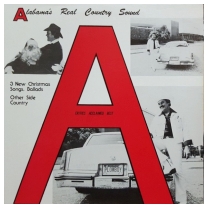 Bob Alday "Alabama's Real Country Sound" (1982) (LP)
Bob Alday "Alabama's Real Country Sound" (1982) (LP)
Singer Bob Alday owned farms in Leroy, Alabama, north of Mobile, as well as in nearby Jackson, where he ran a barbershop, and where this album was recorded. He billed himself as "the Alabama Plowboy," apparently in homage to Eddy Arnold's old nickname, although it sounds like he really had tilled a few fields in his time. This is a curious album, packed with original material, kicking off on Side One with three Christmas songs and an evocative gospel title, "God's Out Of Town." The rest of the record seems to be secular, with Side Two is proudly proclaimed "other side country" on the album cover. Mr. Alday claimed copyright on all the songs (although some have rather familiar themes...) and released the 1982 cassette version of this album under the title, The Alabama Plowboy.
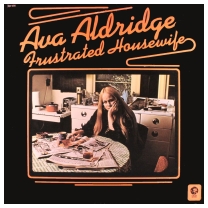 Ava Aldridge "Frustrated Housewife" (MGM Records, 1975) (LP)
Ava Aldridge "Frustrated Housewife" (MGM Records, 1975) (LP)
(Produced by George Soule)
Like a lot of folks in the Muscle Shoals scene, Alabama native Ava Aldridge (1946-2003) sat on the ledge, with country on one side, and soul on the other... Aldridge worked extensively as a backup singer for a wide range of artists -- including Greg Allman, Patti Austin, Jim Dickinson, Levon Helm and Hank Williams, Jr. -- and obviously had deep connections to both country and Southern rock. She was also a successful songwriter, with perhaps her best known song being "Sharing The Night Together," which was a Top Ten hit for Dr. Hook. This was her first and (I think) only solo album, packed with original material, soulful music with a twangy undercurrent, to be sure.
Ernest Ashworth - see artist discography
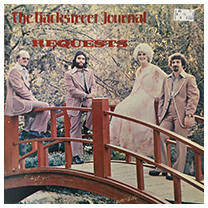 Backstreet Journal "Requests" (Robroy Records, 197--?) (LP)
Backstreet Journal "Requests" (Robroy Records, 197--?) (LP)
(Produced by Gaston Nichols)
An odd little album from Birmingham, Alabama... This quartet, led by vocalist Wanda Lee has the feel of a southern gospel vocal group, though at least half the repertoire is secular material, including covers of pop songs and countrypolitan hits such as Ronnie Milsap's "It Was Almost Like A Song" and Paul Anka's "My Way." They cover a couple of Statler Brothers songs ("It Was Almost Like A Song," "Do You Remember These") and one by John Denver, as well as an earnest reading of Bill Spivery's "Operator" (which was a 'Seventies hit for the Manhattan Transfer). Ms. Lee also plows her way into a milky rendition of "Crazy," though the most country bar-band sounding song is their frantic version of Ray Wylie Hubbard's "Up Against The Wall Redneck Mother" (mistakenly credited to Jerry Jeff Walker) a so-bad-it's-good novelty number which is probably the only really memorable track on this album... To be honest, this is a fairly painful album, with iffy vocals and sparse arrangements. I'm sure these guys must have done some live gigs, but there's no info about where or when that may have been.
Razzy Bailey - see artist profile
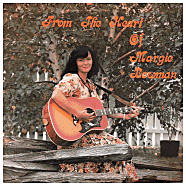 Margie Bowman "From The Heart Of Margie Bowman" (Ranger Records, 19--?)
Margie Bowman "From The Heart Of Margie Bowman" (Ranger Records, 19--?)
(Produced by Forrest Green)
This gal from the town of Ozark, Arkansas wrote most of the songs on this album, adding a few cover tunes from the likes of Merle Haggard, Kris Kristofferson and Loretta Lynn. Bowman was a rough, rural vocalist -- although she pays homage to Loretta, her roots run a little deeper, back to foremothers such as Kitty Wells and more particularly to Jean Shepard, whose proto-feminist anthems are echoed in Bowman's own lyrics. This is best borne out on the album's second track, "Lord, Did You Think Of Lonely Women," in which she directly confronts God (yes, that God!) about the religious double standards that make it okay for men to seek comfort in sex, but don't allow women to do the same. That's probably the most striking song on here, but there are several that are quite good. Bowman is backed by producer Forrest Green and his band, the Rangers, a veteran of the 1950's country scene and former Arkansan himself, who moved to Michigan and settled into a second act as an indie record producer... His band adds a lively, melodic, steel-driven twang, reminiscent of Lynn's best work from the '60s; the album isn't that well-produced, and Bowman's phrasing sounds a little stiff -- nerves, maybe? -- but it's still a cool record. Not entirely sure when this was made, but I'm guessing it was around 1974-75, based on the album art and on the cover tunes: "Me And Bobby McGee" was from the late '60s, but Haggard's "Holding Things Together" came out in '74. Anyone out there know for sure?
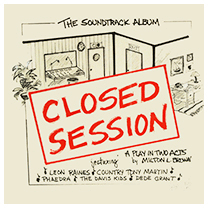 Milton L. Brown/Various Artists "Closed Session: The Soundtrack Album" (DoBro Enterprises, 1987) (LP)
Milton L. Brown/Various Artists "Closed Session: The Soundtrack Album" (DoBro Enterprises, 1987) (LP)
(Produced by Milton L. Brown)
Funded by an arts grant from the state of Alabama, this album was an adaptation of a stage play written by songwriter Milton L. Brown, and features several local musicians from Mobile singing original songs which Brown either wrote or co-wrote. One of the performers is early '80s country crooner Leon Raines, who recorded one major-label album and had a string of mildly successful singles charting in the Country Back Forty; the other artists were more obscure: The Davis Kids, De De Grant, Tony Martin and Phaedra, as well as Brown himself on a tune or two. Several of the songs were co-written by Steve Dorff and a couple with Paul Overstreet, and the Nashville-based recording sessions included Larry Byrom on guitar, Lloyd Green playing dobro and steel, and Buzz Cason adding some vocals.
Sherry Bryce - see artist discography
Jimmy Buffett - see artist discography
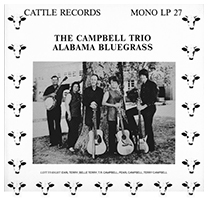 The Campbell Trio "Alabama Bluegrass" (Binge Disc/Cattle Records, 1982) (LP)
The Campbell Trio "Alabama Bluegrass" (Binge Disc/Cattle Records, 1982) (LP)
(Produced by R. C. Smith)
An all-gospel set, by a family band from Leighton, Alabama. The main trio -- T. R. Campbell (vocals, guitar), his wife Pearl Campbell (rhythm guitar, vocals) and their teenage son, bassist Terry Campbell -- started playing together in 1970, and performed local and regional shows, mostly at bluegrass festivals and the like. This session was recorded in March, 1975 at the Mrs. Campbell's family home, with a couple of her relatives chiming in, including her sister Belle Terry on harmony vocals and brother Earl Terry on banjo. This was literally a living room recording session, about as "down home" as you can get!
The Changing Times Band "Almost Alive" (Prestige Productions, 1980-?) (LP)
(Produced by Charlie Hill)
An acousticky band from Birmingham, Alabama doing country, bluegrass and rock oldies covers...
Lee Clayton -- see artist profile
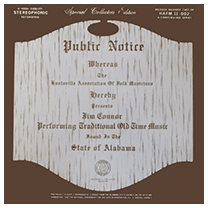 Jim Connor "Alabama Old Time Music" (Huntsville Association Of Folk Musicians, 1974) (LP)
Jim Connor "Alabama Old Time Music" (Huntsville Association Of Folk Musicians, 1974) (LP)
(Produced by Doug Crosswhite)
A back-to-basics old-timey twang album from banjoist Jim Connor, who grew up in Gadasen, Alabama and found national fame as part of the Richard & Jim folk duo, along with guitarist Richard Lockmiller. Connor learned his trade in the late 1950s, worked the folk circuits on the East Coast, then returned home in 1967 and made a name for himself on the local folk scene in Birmingham. This album was underwritten by the Huntsville Association Of Folk Musicians, and showcases Jim Connor playing oldies on a variety of vintage instruments. He also provides pleasantly chatty commentaries on the individual tracks, including some explanation of his apprenticeship with banjo-plunking elder Arthur Kuykendall, of Albertville, Alabama, who he also gave a nod in the title of his solo "debut" the following year.
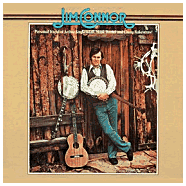 Jim Connor "...Personal Friend Of Arthur Kuykendall, Monk Daniel And Cluny Rakestraw" (RCA, 1975) (LP)
Jim Connor "...Personal Friend Of Arthur Kuykendall, Monk Daniel And Cluny Rakestraw" (RCA, 1975) (LP)
(Produced by Milt Okun & Kris O'Connor)
Love the album title. (The three names refer to an old-timey banjoist who mentored Connor, a fiddler who played on his early albums, and the fictional(?) Cluny Rakestraw, which was apparently a made-up name that guitarist Clarence White used as a faux songwriter credit for traditional material...) Anyway, in the early 1960s, banjoist Jim Connor was part of the Richard & Jim folk duo, which had a major paying gig as performers on ABC's nationally-broadcast "Hootenanny" TV show, where they mixed genuine old-timey music with a smoothed-out version of old country variety shows. A pretty hot banjo player, Connor was a master of the Appalachian "frailing" style whose technique was praised by none other than Earl Scruggs; later in the decade he joined the New Kingston Trio, and in the early '70s he became a sideman in John Denver's band. This was a solo record that Connor made after Denver recorded one of his songs -- "Grandma's Feather Bed" -- on his 1974 gold album, Back Home Again. Denver also appears on this record, singing lead vocals on the first track, "Banjo Song," and sings harmony on some other tracks. It's a far-flung, kooky album, with kind of a similar vibe to John Hartford's '70s records, though maybe not quite as relaxed and funky. There's plenty of hot, fast banjo plunking, though, with backing by hot pickers such as James Burton, Emory Gordy and Connor's longtime friend Steve Young, who plays guitar and gets several shout-outs in the liner notes. Some of this material seems a little forced, but it's still a noteworthy album that's emblematic of the eclectic vibe of the '70s.
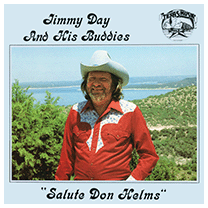 Jimmy Day & His Buddies "...Salute Don Helms" (Texas Musik, 1980) (LP)
Jimmy Day & His Buddies "...Salute Don Helms" (Texas Musik, 1980) (LP)
A solo set by a consummate sideman. Steel guitar pro Jimmy Day (1934-1999) was an Alabama native who played on the "Louisiana Hayride" as a kid, and backed many of the giants of the 1950's honkytonk era during a stint in Nashville. Later, Day settled in Texas and was a stalwart of the '70s Lone Star scene. This album was a tribute to Don Helms, the legendary steel player in Hank Williams' band, with sympathetic backing by several "buddies": Buddy Emmons and Buddy Spicher, and drummer Buddy Harmon. Heh, heh. Anyway, if you're a country instrumental fan, you're gonna want to check this one out.
Johnny Darrell -- see artist profile
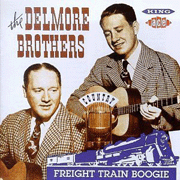 Delmore Brothers "Freight Train Boogie" (Ace Records, 1993)
Delmore Brothers "Freight Train Boogie" (Ace Records, 1993)
The late-'Forties/early 'Fifties "hillbilly boogie" phenomenon found its highest expression in these guys' work. The Delmore Brothers -- Alton and Rabon -- had been working together for years before they signed to the up-and-coming Cincinnati country/R&B indie, King Records. Giving their old-fashioned "brother act" sound a major goose, the Delmore Brothers put hillbilly boogie on the map with a series of upbeat, blues-flavored tunes that were simultaneously peppy and mournful. "Freight Train Boogie", "Brown's Ferry Blues", and their mopey masterpiece, "Blues Stay Away From Me" all became classics in the country canon. In addition to their plain but plaintive harmonies, the Delmore Bros had a few secret weapons on their side, including the musical assist of other high-power hicks such as Zeb Turner, Wayne Raney and Jethro Burns backing them up incognito. This album collects the 1946-51 tracks that had the greatest influence on country music, and also in the development of rock and roll, a few years later. It's pretty tasty stuff.
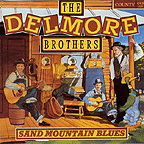 Delmore Brothers "Sand Mountain Blues" (Rebel/County Records, 1994)
Delmore Brothers "Sand Mountain Blues" (Rebel/County Records, 1994)
Folks who want to delve a little deeper into the Delmore's past will appreciate these discs, which collect a bunch of their more old-timey material. The recordings on Sand Mountain are traditionally-oriented tunes that were recorded during their stint on King, while Brown's Ferry Blues features even starker material from the 1930s, when they were playing on radio stations such as WSM in Nashville. The earliest Delmore Brothers records and radio appearances apparently had a great stylistic influence on bluegrass pioneer Bill Monroe, as well as the other great "brother act" of the time, the Blue Sky Boys. Dark as their disciples may have been, few country acts were ever as genuinely downcast as the Delmore Brothers, and these early recordings may shock you with how stark and morose they sound. Great stuff, highly recommended.
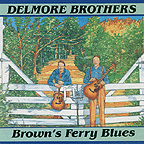 Delmore Brothers "Brown's Ferry Blues" (Rebel/County Records, 1995)
Delmore Brothers "Brown's Ferry Blues" (Rebel/County Records, 1995)
Delmore Brothers "Classic Cuts: 1933-1941" (JSP Records, 2004)
A bargain-priced 4-CD set, exploring their early work before the hillbilly boogie years... Includes a pretty hefty chunk of their prewar catalogues on Bluebird and Decca, stuff that many fans consider a country music Holy Grail.
Delmore Brothers "Volume Two - The Later Years: 1933-1941" (JSP Records, 2007)
A bargain-priced 4-CD set, with many of their classic recordings. Good stuff!
 The Delmore Brothers "That Old Train" (BACM, 2005)
The Delmore Brothers "That Old Train" (BACM, 2005)
(Available through the British Archive of Country Music website.)
Jim Dickinson - see artist profile
 Dixie Dover "Haunting Memories" (Twileen Records, 1979) (LP)
Dixie Dover "Haunting Memories" (Twileen Records, 1979) (LP)
(Produced by Clyde Varner & Tommy Strong)
Hailing from Birmingham, Alabama, singer-songwriter Dixie Dover wrote most of these songs herself, with one co-written with producer Clyde "Josh" Varner... The set includes her songs "Truck Driver's Dream," as well as "He's Living In Your House (But He's Sleeping In Mine)." Recorded in Nashville, this album has an all-pro studio crew, with folks like DJ Fontana, Willie Rainsfield, Dale Sellars
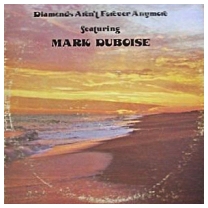 Mark Duboise "Diamonds Aren't Forever Anymore" (Duboise Records, 1978) (LP)
Mark Duboise "Diamonds Aren't Forever Anymore" (Duboise Records, 1978) (LP)
(Produced by Don Cartee & Alan Cartee)
I can't tell you much about this one, other than that Mr. Duboise appears to have been from Alabama, and was one of the many way-off-the-radar artists who recorded an album through what I've started calling "the beach label," a vanity/custom service that recycled the same photograph for numerous LPs. Anyway, the liner notes say this one was recorded in Muscle Shoals, Alabama and the backing musicians are an interesting lot: Lenny LeBlanc, who had a few modest pop hits under his belt, is the bass player, while Jerry Wallace plays rhythm and lead guitar, with Doug Jernigan on pedal steel and Tim Henson tickling the ivories... The backup singers include Ava Aldridge and Sue Richards, two country second-stringers from Alabama who had a few hits in the '70s. Apparently all the songs on here were originals (except for a cover of "Green Green Grass Of Home"), all written by producer Alan Cartee, who was kind of a jack-of-all-trades -- songwriter, engineer, etc. -- who later opened a successful sound studio in Nashville.
Narvel Felts - see artist discography
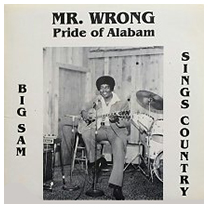 Big Sam Frazier, Jr. "Mr. Wrong/Pride Of Alabam: Big Sam Sings Country" (Blue Rock Records, 19--?) (LP)
Big Sam Frazier, Jr. "Mr. Wrong/Pride Of Alabam: Big Sam Sings Country" (Blue Rock Records, 19--?) (LP)
(Produced by Kenny Wallis)
Sam Frazier was an African-American country singer, part of Birmingham, Alabama's long-running Country Boy Eddie Show, kind of a low-rent, locally produced Hee Haw-style variety/comedy/talk program that aired on early-morning on WBRC-TV for over thirty years (and was a key stepping stone in Tammy Wynette's career). Frazier originally sang in blues and R&B bands, but went into country at the urging of show host Eddie Burns, and performed on the show for several years in the early 1970s. He had several other prestigious gigs, including a job singing at Mickey Gilley's club in Texas, and recorded for the Blue Rock label in the late 1980s. This album has lots of original material, including a Sid Linard song, "There You Go Running Down My Cheek Again" and the sentimental "Grandma Can I Read To You," written by Ruth Finch, an 80-year old who is pictured on the back cover.
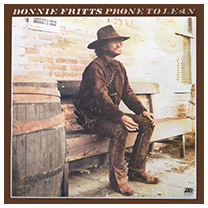 Donnie Fritts "Prone To Lean" (Atlantic Records, 1974) (LP)
Donnie Fritts "Prone To Lean" (Atlantic Records, 1974) (LP)
(Produced by Dan Penn)
Born in Florence, Alabama, keyboardist Donnie Fritts was a vital session player in the Muscle Shoals studio scene of the 1960s and '70s. He found success both as a backing musician and -- more modestly -- as a songwriter, penning tunes for Jerry Lee Lewis, Charlie Rich and others. In the early 'Seventies he hooked up with superstar Kris Kristofferson and worked in his band for decades to come. This solo debut reflected his R&B/soul roots, recorded with Dan Penn and other longtime Muscle Shoals collaborators.
Vern Gosdin -- see artist discography
Roger Hallmark "When You Care Enough To Hear The Very Best" (SRC, 19--?) (LP)
A novelty songwriter from Birmingham, Alabama, Roger Hallmark (1946-2014) was one of those country guys who found a sideline in writing songs about college sports teams and popular coaches. He also had a string of anti-Islamic novelty numbers stemming out of the 1979 Iranian hostage crisis: "A Message To Khomeini" "Chicken Shiites," "You Don't Mess With Uncle Sam," and "Pluck Khadaffy Duck" (which was issued as an EP that included a "rap" version. In addition to this disc, he also apparently cut an album of football fight songs called Alabama Football Songs. Go, Crimson Tide!
Emmylou Harris -- see artist profile
Freddie Hart - see artist profile
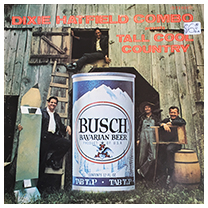 The Dixie Hatfield Combo "Tall Cool Country" (Gulf Crest Records, 1975-?) (LP)
The Dixie Hatfield Combo "Tall Cool Country" (Gulf Crest Records, 1975-?) (LP)
An early 1970s album by a group originally formed in the late '50s by country deejay Dixie Hatfield, who worked at Montgomery, Alabama's WBAM. This edition of the band also features fellow DJs Jimmy Hicks (drums) and Gerald Driver (bass), taking turns singing hits such as "Four Walls," "Silver Wings," "Wine Me Up," "Mental Journey" and (my favorite!) "Six Pack To Go." None of these guys were super-great vocalists, but they were having fun and sound like some pretty cheerful good ole boys... The band is alright, too, with solid steel guitar picking and some wildly out of control psychedelic-fuzz guitar on their gogo-delic version of Dallas Frazier's "Mohair Sam." There are two original songs at the end of the album, both co-written by drummer Jimmy Hicks and L. H. Stockmar, "You Tear Me To Pieces" and "Today Ended Everything," which both have florid orchestral arrangements swelling behind Hicks' vocals -- I'm guessing these tracks were recorded separately from the rest of the record, possibly as a single that came out earlier.
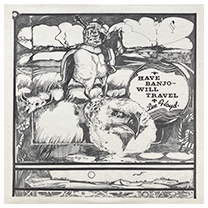 Lee Floyd "Have Banjo, Will Travel" (Hot Banjo Society Records, 1978) (LP)
Lee Floyd "Have Banjo, Will Travel" (Hot Banjo Society Records, 1978) (LP)
(Produced by Lee Carpenter)
This one is more of a don't-say-I-didn't-warn-you kinda thing... Yes, he is playing banjo, and yes, he's from Mobile, Alabama, but this is banjo music more in the tradition of Harry Reser and Eddie Peabody, rather than Earl Scruggs or Bill Keith. On the other hand, Lee Floyd's turbo-charged, almost fusion-y approach to Dixieland trad-jazz has its moments. He's a dazzlingly fast, energetic picker/strummer -- a real string scorcher -- and banjo fans writ large should dig this for its technical dazzle alone. The musicians include Lee Floyd III (on banjo), John Etheridge (percussion), Carl Fontana (trombone), Dave Gannett (tuba and electric bass) and bluesy vocalist Barbara Norlin torching it up on a trio of tunes. Not country or bluegrass (at all) but still pretty zippy.
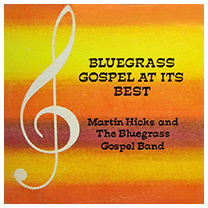 Martin Hicks "Bluegrass Gospel At Its Best" (FCH Records, 19--?) (LP)
Martin Hicks "Bluegrass Gospel At Its Best" (FCH Records, 19--?) (LP)
A gospel bluegrass bandleader with a career spanning back at least to the early 1960s, Martin Hicks was living in Camden, Alabama when he cut this album, and this seems to have been his family home, as he's surrounded by family members on this indie album: Mr. Hicks sings and plays guitar, with backing from his sons, Martin Hicks III (mandolin and harmony vocals), Robert Hicks (bass) and James Hicks (banjo), as well as his brother Leonard L. Hicks (rhythm guitar), and Eddie Michael on fiddle. The repertoire is heavy on gospel standards, though his earlier singles and EPs mined a wealth of original and more obscure material. Martin Hicks led several different bands, and most likely was working and living in a few other states at the time, including stints on Arzee Records (in Philadelphia) and what seems to have been his own Loyal Records, which gave addresses in Edwardsville, Illinois as well as Birmingham, Alabama; as far as I can tell, these earlier recordings have not been anthologized, and this disc seems to have been his only full album.
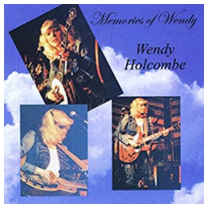 Wendy Holcombe "Memories Of Wendy" (Adonda Records, 2010)
Wendy Holcombe "Memories Of Wendy" (Adonda Records, 2010)
A banjo and guitar prodigy, Birmingham, Alabama's Wendy Holcombe made her debut on the Grand Ole Opry in 1975, at the age of twelve(!) Both talented and telegenic, she went on to appear on Hee Haw and to tour with established bluegrass stars such as Bill Monroe and Mac Wiseman, and landed steady work as a television actor in the early '80s. Tragically, Holcombe died at age 23 as the result of cardiomyopathy. This posthumous album is an impressive collection of recordings with Holcombe delivering dazzling and precise banjo and electric guitar riffs... She was a real superpicker!
Wendy Holcombe "On Tour" (Adonda Records, 1979) (LP)
(Produced by Don Fowler & Jack Logan)
All bluegrass standards, except for a couple of country songs by Dolly Parton ("Apple Jack") and Gail Davies ("It's No Wonder I Feel Blue") Her band included steel guitarist Mike Johnson and Bruce Osborn on dobro and guitar, as well as fiddler Tommy Rutlidge.
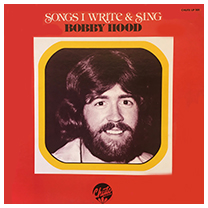 Bobby Hood "Songs I Write And Sing" (Chute Records, 1978) (LP)
Bobby Hood "Songs I Write And Sing" (Chute Records, 1978) (LP)
(Produced by Gary Lamb & Jim Cotton)
As advertised, all the songs on this album were composed by aspiring songwriter Bobby Hood Jr., a shaggy-looking, bearded young'un who looks like he was trying to be the next Kris Kristofferson. Originally from Muscle Shoals Alabama, he did his time in Nashville and enjoyed reasonable success both as a songwriter and as a recording artist in the late 'Seventies and early 'Eighties before heading back home around 1982. Hood recorded singles for several different labels, though this may have been his only full album. It's a nice record, kind of low-key and mainstream -- here he reminds me of Roger Miller or perhaps Bill Anderson, although on some of his singles he tried on different styles and personas, including a little bit of the emotive pop vocals practiced by dudes like Kenny Rogers. Hood kept working back in Alabama, but he died young, killed in a 2007 car crash at the age of fifty-two.
Autry Inman - see artist profile
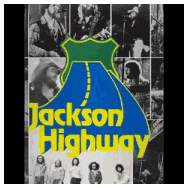 Jackson Highway "Jackson Highway" (Muscle Shoals Sound, 1977) (LP)
Jackson Highway "Jackson Highway" (Muscle Shoals Sound, 1977) (LP)
A diverse, uneven, but ultimately winning indie-twang album made by some Alabama natives who were in tight with the Muscle Shoals studio crew... The country stuff on here I like a lot, particularly tracks like "Wayne Co., Tennessee," which sounds like one of those early, non-sucky Eagles twang-tunes, or "Pickup Truck," where he's hitting up some girl with the oh-so-alluring promise of riding around in his truck all day, and, well, doing a little "trucking" as well. Less fun, for me, are the redneck disco tunes and overblown rockers... Guess I'm just not that into electric guitar solos anymore, though I imagine Southern rock fans will find both styles on this album equally groovy. Definitely worth a spin!
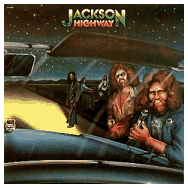 Jackson Highway "Jackson Highway" (Capitol Records, 1980) (LP)
Jackson Highway "Jackson Highway" (Capitol Records, 1980) (LP)
(Produced by Jimmy Johnson & David Hood)
Yeesh. Really big change here. This major-label album opens up with a horrible, shrill, pompous rock number that reminds me more of Rush than Charlie Daniels, then careens into "Rock And Roll Man (Hung Up On A Disco Girl)" a novelty song with a promising title, but one that sounds like a Bob Seger outtake. Sadly, it never gets better. They redo a couple of songs from their first album ("Circles" and "Hook, Line And Sinker") and really royally screw them up. There's no twang anywhere on this album, and while there's a definite Southern rock influence, it's so buried in bad, bland, misguided, coked-up overproduction that they wind up sounding like Dee Snyder jamming with Supertramp, which I definitely do not mean as a compliment. It's really not my cup of tea... Probably not yours, either. (Footnote: after writing this I discovered I was right about the Bob Seger thing: one of the guys in this band actually wound up recording with Seger's band, playing lead guitar on his big hit, "Old Time Rock and Roll." So there ya go.
 Paul Jackson "Jareco Records Presents Songs For Your Listening Pleasure" (Jarelco Records, 19--?) (LP)
Paul Jackson "Jareco Records Presents Songs For Your Listening Pleasure" (Jarelco Records, 19--?) (LP)
Impressively primitive lo-fi country from Paul Jackson "and his band," a work-for-hire crew from Athens, Alabama which put out an undetermined number of 7" singles and LPs. Mr. Jackson was the owner of Jareco Records, a backwoods song-poem label that solicited lyrics from amateur auteurs and put their words to music, selling the records to both their clients and (hopefully) to the public at large. This may be the earliest of his albums, with all the songs (co)written by a guy named Richard Mitchell... The opening song, "Annalene," is about as un-formed and bare-bones a tune as you're ever going to hear, but later tracks are more complex, and a couple, like "Heaven Ain't That Kind Of Place," are actually pretty good. In the novelty-song sweepstakes, this disc offers a real doozy, an anti-hippie rant called "Disciples Of The Devil," which conflates growing long hair with homosexuality and devil worship, with the narrator taking great delight in the inability of all the pinkos listening to shut him up. But why would we want to? That's some real-deal, southern redneck culture-war backlash stuff... a real hoot. Also remarkable is the unrelenting roughness of Mr. Jackson's musicianship -- an unskilled singer with a barely-engaged band behind him, Jackson nonetheless exudes brazen confidence and real rural roots. I really dig it, and not in an ironic way.
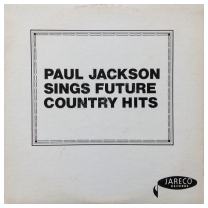 Paul Jackson "...Sings Future Country Hits" (Jareco Records, 19--?) (LP)
Paul Jackson "...Sings Future Country Hits" (Jareco Records, 19--?) (LP)
The hopeful album title belies the exceptionally retro feel of this low-key set of homespun hillbilly music, simple twangtunes with an early 1950s feel (though this album looks like it was recorded in the mid-1960s to-mid-1970s...) This disc offers heartfelt compositions by a dozen-plus amateur songwriters arranged and performed by Paul Jackson -- an obscure, rugged-voiced honkytonker with harmony vocals by an unidentified female singer. Most tracks have simple but effective accompaniment featuring acoustic guitar and modest percussion, though a couple also have some nice steel guitar. The album art is minimal: only the plain title on the front cover, with nothing on the back, though all the song credits are included on the inner label. Fans of oddball hillbilly singers such as Eddie Noack might really enjoy this one: there are sentimental numbers, gospel songs and even a Cold War novelty-gospel number about the specter of nuclear Armageddon. A humble gem of anachronistic, uber-indie Southern twang.
 Paul Jackson "...Sings Country And Gospel" (Jareco Records, 1972) (LP)
Paul Jackson "...Sings Country And Gospel" (Jareco Records, 1972) (LP)
Okay, so here's the deal: Mr. Jackson ran an ad in Billboard magazine, on September 23, 1972, offering this album for $5.00 per copy (or free to radio stations) and soliciting lyrics from aspiring songwriters, promising them fifty-percent publishing rights. So, yes, he was a song-poem artist, and this was his general time frame. I'm not sure which of these records came out first, though...
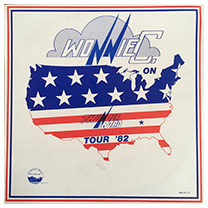 Wonnie C. Johnson "On Thunder Road Tour '82" (Mountain Music Records, Inc., 1982) (LP)
Wonnie C. Johnson "On Thunder Road Tour '82" (Mountain Music Records, Inc., 1982) (LP)
(Produced by Jack Eubanks)
Songwriter Wonnie C. Johnson (1945-2013) was a resident of Section, Alabama -- near Scottsboro -- and recorded several singles, including songs from this album. This disc was recorded in Nashville with a big, usual suspects crew: steel player Doug Jernigan, Willie Rainsford, Fred Newell, Leo Jackson, Hoot Hester, and The Cates Sisters... Johnson wrote a couple of originals for this album, including "Rodeo Cowboy" and "Trucker's Rhythm" -- there are also some tunes penned by Buck Moore: "I Stood Your Leavin'," "Diamond In The Rough," and "I'm Coming Home, Louisiana." His 1981 single, "Cowboys And Indians Don't Cry," got a small plug in Billboard. This seems to have been his only full album, and other biographical information remains scarce.
Killough & Eckley "Killough & Eckley" (Epic Records, 1977) (LP)
(Produced by Don Gant)
Rock Killough "Highway 31" (Elektra Records, 1980) (LP)
(Produced by Don Gant)
 Rock Killough & The Mynke Brothers Band "Music From The Cottonbelt" (Cotton Belt Records, 1982) (LP)
Rock Killough & The Mynke Brothers Band "Music From The Cottonbelt" (Cotton Belt Records, 1982) (LP)
(Produced by Jack Schey)
Indie country stuff, though with a folk-pop blend... These guys were from Tuscaloosa, Alabama though they recorded this album in Nashville, at the studios of Opryland TV, apparently with a little help from Roger Sovine. The band included lead singer and guitarist Rock Killough, along with Bill Austin (bass), Kenn Beal (lead guitar), Robert Bethnea (drums), David Brazeal (percussion), Randy Harrold (organ) and Randy Moon on piano
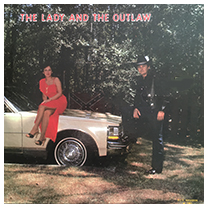 The Lady And The Outlaw "The Lady And The Outlaw" (Ken Cormier Productions, 1981) (LP)
The Lady And The Outlaw "The Lady And The Outlaw" (Ken Cormier Productions, 1981) (LP)
(Produced by Ken Cormier & Barbara Cormier)
Some folks earn the "outlaw" name the hard way: star-crossed singer Ken Cormier was convicted of armed robbery in 1972 and spent nine years in Florida State Prison, teaching himself guitar as his forty-year sentence unfolded. Upon his parole, Cormier went into audio-video production and cut this album at his own studio, which he opened in Dothan, Alabama. Guitarist Mark Swindell provides most of the musical ooomph, multi-tracked on rhythm, lead and bass, with Chuck Ledford chiming in on keyboards, sax and flute, the latter hinting at the goopier side of this album... Overall, this disc wasn't gonna set the world on fire -- Cormier had a pleasant voice with a plainspoken, Merle Haggard-ish vibe, but the mid-tempo arrangements are kinda sleepy and sound pretty similar from track to track. Still, there's a lot of sincerity in these performances, particularly on prison-oriented songs like "The Lady And The Outlaw" and "Hidie And My Last Day," a death row ballad about a little girl visiting her daddy on the day of his execution. Cormier's other big project in 1981 was filming and marketing live videos of an up-and-coming local band called Wild Country -- which changed its name to Alabama -- then being served a cease-and-desist order by their new record label, RCA, which said it had exclusive rights to the band's image. A lawsuit ensued, and I'm sure the legal tussle with a major-label media giant didn't help the struggling entrepreneur. Anyway, as far as I know this was Cormier's only album, although a couple of years later the studio was still open, and he was working on a feature film called "From Prison To Nashville," based on his life story, with Willie Nelson's daughter Susie to be cast as his wife, Barbara. Dunno if the movie deal panned out, but this album isn't a bad legacy, at least for fans of local DIY twang.
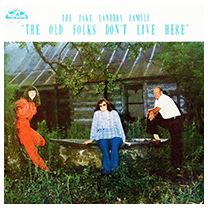 The Landers Family "The Old Folks Don't Live Here" (Old Homestead Records, 1981) (LP)
The Landers Family "The Old Folks Don't Live Here" (Old Homestead Records, 1981) (LP)
Bluegrass gospel from a rootsy family band, centered on multi-instrumentalist Jake Landers (1938-2018), a solid picker from Alabama who co-founded the Dixie Gentlemen band along with mandolin picker Herschel Sizemore and Rual Yarbrough, who adds a few banjo licks on this album. Also on board are family members John Landers (lead and harmony vocals), and daughters Phyllis and Wanda Landers on vocals, as well as Melvin Hallmark plunking bass, and Al Lester playing fiddle. Jake Landers was a prolific songwriter, penning numerous tunes for the Dixie Gentlemen, as well as most of the songs on this album. Highlights include "I Thank God For America Today" (co-written with Herschel Sizemore) and "I'm Working For The Lord," which was co-composed with Mr. Hallmark.
The Jake Landers Family "The River Is Deep" (Old Homestead Records, 1982) (LP)
Same group as above, though without John Landers and a slightly different cast of supporting players. Here, Jake, Phyllis and Wanda Landers are joined by T.R. Campbell on guitar, Melvin Hallmark (banjo) and Larry McWilliams on fiddle. The repertoire remains rock-solid gospel twang, though.
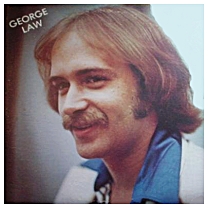 George Law "George Law" (Bongwater Records, 1977) (LP)
George Law "George Law" (Bongwater Records, 1977) (LP)
(Produced by Tom Nist)
This album actually sounds like what you imagine the 'Seventies to stereotypically sound like. It's frequently tagged as a southern rock disc, but other than one track that explicitly calls out to the genre -- "Southern Fried Rock 'N' Roll" -- it's really more of a spaced-out, cosmic-stoner folk-rock thing. It definitely has a country core, but along with the slide and pedal steel, there are flutes, flugelhorns, clavinet and electronic organ, some flowery AOR sounds along with the twang. Songwriter George Law was originally from Montgomery, Alabama, and for much of the 'Seventies he aggressively pursued a music career, including a stint doing some session work at the New London Studio, in Birmingham, where he cut his first single in 1976, soon followed by this album. He's backed by the core lineup of local jazz-prog band Backwater, which included Robby Catlin, Trippe Thomason, Scott Pettersen, and producer Tom Nist, who also plays several instruments on the album. The arrangements are a cut above many private-press albums, and though Mr. Law didn't have the greatest voice, he was fully committed to his music, and to his songs, as goofy and drugged-out as they may be. And they are doozies. Some of this album is relatively down-to-earth, but as you get deeper into it, he really drifts into outer space, rambling on about the secrets of the universe and all manner of oblique metaphysical insights. And when the pedal steel kicks in, it's just that much sweeter. (Thanks to the Alabama Journal for their 1990 profile article by Mike Land, which helped fill in some blanks.)
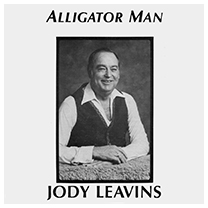 Jody Leavins "Alligator Man" (Ho-Daddy Records, 1985) (LP)
Jody Leavins "Alligator Man" (Ho-Daddy Records, 1985) (LP)
(Produced by Julian Tharpe & Roland Thompson)
Maybe more of a swamp-pop thing, this was an LP recorded by Alex "Jody" Leavins (1927-2000) a nightclub owner from Panama City, Florida with connections to the regional rock and soul scene. The title track, "Alligator Man," is a callback to a single Leavins recorded in 1967 that included a version of the song (originally written by country star Jimmy C. Newman) with a B-side, "Why Have I No Daddy," that is also reprised on this album. Apparently the steel guitar on this album, by Julian Tharpe, is phenomenal; also backing Mr. Leavins is guitarist John Rainey Atkins, who worked with Roy Orbison, and played the hook line on his hit, "Pretty Woman." In the early 1970s, Mr. Leavins owned a Panama City nightclub called the Playhouse, though he seems to have had ongoing legal troubles throughout the decade, including a tax evasion case that earned him a prison sentence in '72. His son, Jimmy Leavins (1946-2016) was a successful professional musicians who played drums for Aretha Franklin, Ricky Nelson, Johnny Paycheck, Hank Williams, Jr., and others, before starting his own group, the Lower Alabama Band, retiring after a heart attack at a show where they opened for Willie Nelson.
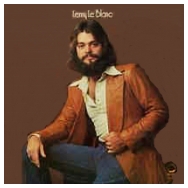 Lenny LeBlanc "Hound Dog Man" (Atlantic/Big Tree Records, 1976) (LP)
Lenny LeBlanc "Hound Dog Man" (Atlantic/Big Tree Records, 1976) (LP)
(Produced by Pete Carr)
A soft-rock album with deep Muscle Shoals roots... Songwriter Lenny LeBlanc was in a highschool band with guitarist Pete Carr, who later recruited him to join the Alabama roots-soul scene, where he sang backup for a number of star artists before breaking out as a solo performer with this debut disc. The album opens with "Desert Cowboy," a nice, breezy country-rock song in the Firefall/Michael Martin Murphey style. From there, though, he dives straight into the '70s soft-rock sound, with only traces of twang here and there. Fans of '70s AOR will find this a rewarding record -- twangfans maybe a little less so -- with a rich mix of largely original material. Notable is LeBlanc's version of "Sharing The Night Together," which became a Top Ten hit for Dr. Hook two years later... I've seen soul singer Arthur Alexander credited as the first person to record this song (also in '76...) but I wonder if LeBlanc didn't actually record it first: "Sharing The Night" composer Eddie Struzick co-wrote a couple of other songs with LeBlanc on this album, and sings harmony throughout. Anyway, this is an earlier version than the one you know, and has a nice mellow feel. The title track was an homage to Elvis-era oldies rock; oddly enough, Atlantic changed the album name to Lenny LeBlanc, presumably to downplay the rural-sounding original title, and sell LeBlanc as more of a pop artist. Which makes sense: there's some twang on here, but not a lot.
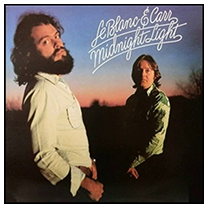 LeBlanc & Carr "Midnight Light" (Atlantic/Big Tree Records, 1978) (LP)
LeBlanc & Carr "Midnight Light" (Atlantic/Big Tree Records, 1978) (LP)
Bigger pop success was found with this duo album, where the song "Falling" cracked into the Top 15, a significant soft-pop single of the disco era that stands up there with harmony-laden hits from folks like the Little River Band, et. al. Can you say "guilty pleasure"? Sure you can. Anyway, after surviving the '70s, LeBlanc got religion and started a new career as a contemporary Christian artist, though he'd had decent success on the Pop charts before that change...
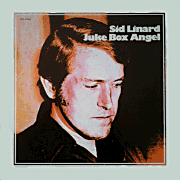 Sid Linard "Juke Box Angel" (Ovation Records, 1976) (LP)
Sid Linard "Juke Box Angel" (Ovation Records, 1976) (LP)
(Produced by Henry Strzelecki)
This is a cool, twangy honkytonk-edged country set, with plenty of cheatin' songs, boozing tunes, and their natural compliment, divorce songs. Like Moe Bandy around the same time, Birmingham's Sid Linard was kind of an unexpected throwback to a grittier sound than what was generally in the air in the mid-'70s and he threw himself into hard country tune like "Juke Box Angel" and the anti-alimony anthem, "I'm Not Gonna Let You Sock It To Me (Lying Down)," as well as the good-timing "The Undertaker's Gonna Have A Hard Time (Wiping The Smile Off Of My Face)," which Jerry Lee Lewis would have had a field day with as well. All the songs are originals by Linard, with one song about hardcore alcoholism, "A Lord Calvert's Kind Of Day," resurfacing on the 2012 sitcom, "Parenthood." This album failed to make even a tiny dent in the country charts, and Linard faded from sight, although he did pen a 1979 political novelty song, Roger Hallmark's 1979 single, "A Message To Khomeini." Other than that, I wasn't able to track down much info about this guy. He did make one great record, though, and I'm listening to it right now. If you like Jerry Reed or Moe & Joe, you might want to check this guy out.
Sid Linard "I've Had Mine" (Brylen Records, 1982) (LP)
Apparently his swan-song, this album includes seven songs by Sid Linard, including remakes of two that appeared on his first album, "I'm Gonna Do My Thing" and "A Lord Calvert's Kind Of Day," though in this version Jack Daniels is the booze of choice: I guess Lord Calvert's was a little too fancy-pants for the country crowd in the early '80s. Also included are a couple of songs by Henry Strzelecki, who'd been working with Linard for many years.
 George Lindsey "Goober Sings!" (Capitol Records, 1968-?) (LP)
George Lindsey "Goober Sings!" (Capitol Records, 1968-?) (LP)
The first album by TV actor George Lindsey (1928-2012), best known for his role as "Goober Pyle," one of the down-to-earth locals on The Andy Griffith Show and on its successor, Mayberry RFD. Like his TV "cousin," Jim Nabors, Lindsey was an Alabama native with a knack for portraying slack-jawed yokels, and he extended that hick persona to his personality-album comedy records, and later in a long stint with on Hee-Haw. This album tilts towards comedy, with songs like "I Ain't Good Looking (But I'm Mighty Sweet)" and "I'll Live Here Till I Die," as well as "Write Me R.F.D.," which was probably tied to the new TV show.
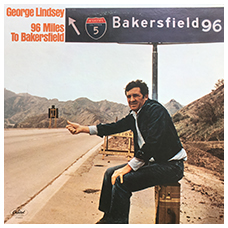 George Lindsey "96 Miles To Bakersfield" (Capitol Records, 1969-?) (LP)
George Lindsey "96 Miles To Bakersfield" (Capitol Records, 1969-?) (LP)
(Produced by Kelso Herston)
As the title implies, this album has a little more of a hard-country feel, although it's not quite the West Coast twangfest you might imagine... The title track was written by Sonny Curtis, and is followed up with a cover of the Wynn Stewart hit, "It's Such A Pretty World Today," which Lindsey plays fairly straight. The rest of the record is more overtly comedic, with some hits and some misses... Some tracks, like "Everything Else Is Just Toothpaste" and "If I Only Had A Brain" are played pretty broadly and are a little painful to listen to, though others are surprisingly solid, such as his versions of "Plastic Saddle" and Red Lane's "It'll Be Me." Lindsey doesn't always put on the Goober voice, and the tracks where he uses his natural voice are decent, if not earthshaking, country material, with a hint of Roger Miller in his delivery... The liner notes don't identify the studio musicians, although one would assume they're all Capitol country A-listers... Producer Kelso Herston penned a couple of the songs, and several are co-written by Ron Chancey. The liner notes make reference to the Mayberry RFD show, which was in full swing at the time. Nothing mind-blowing here, though it's probably better than you imagine.
George "Goober" Lindsey "...Goes To Town" (MCA Records, 1982) (LP)
(Produced by Bill Glasser & Brian Vessa)
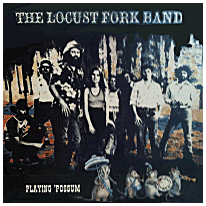 The Locust Fork Band "Playin' Possum" (LFB Records, 1978) (LP)
The Locust Fork Band "Playin' Possum" (LFB Records, 1978) (LP)
(Produced by Travis Rivers)
A longhair boogie band from Montgomery, Alabama who probably had pretty big dreams. There's definitely some twang in here, mostly on a couple of tongue-in-cheek country songs, though these folks were more of a boogie-rock and Southern rock/jam band outfit, also balancing things out with a few really goddawful would-be Top Forty '70s pop songs. Several different bandmembers sing lead on various songs, some are good and some... well, less so. Musically, these guys had some chops and probably were pretty popular live, although they probably needed to either tighten things up and trim the fat on a few songs, or else just go for it and become a crazy jam band. Either way, this album wound up being a groovy time capsule of Deep South semi-alterna-rock, giving a taste of what folks just outside the orbit of the whole Muscle Shoals/Memphis scene could sound like. I do like the country stuff, too, especially the cheatin' song, "Overnite Success," written by Bill Marshall... His tune "Tuscaloosa" is another album highlight. Also worth noting are a few of the guest performers, including Charlie Daniels and Tracy Nelson, who sings backup on four of the songs. I wouldn't say I love this album, but if you get a chance, check it out.
The Louvin Brothers - see artist discography
 Frankie Lowery & The Allstars "The Peppermint Lounge Presents..." (Peppermint Lounge, 196-?) (LP)
Frankie Lowery & The Allstars "The Peppermint Lounge Presents..." (Peppermint Lounge, 196-?) (LP)
Despite the groovy, British Invasion-style artwork, this was definitely a country-oriented album, with cover songs such as "Crazy," "Blue Eyes" "Steel Guitar Rag" and "Walking Piece Of Heaven," and also seems to have come out quite a bit later that the 'Sixties-ish artwork would suggest. Singer-pianist Paul Franklin Lowery and his brother, sax player Willie Lowery, were longtime fixtures on the Alabama music scene, although the details of their careers are scant. They grew up in Mobile and headlined at Jerrell Stevens's Peppermint Lounge nightclub in Hunstsville, Alabama for much of the 1970s. Before that, Frankie Lowery had been a pop and R&B artist playing gigs in Lake Charles, Louisiana, back around 1960 or so, when he also cut a few singles for local labels such as Khoury Records and Dart, backed by a combo called The Golden Rockets. The Lowery Brothers were joined on this album by an "allstar" band which included Jesse James Davis (bass), Marvin Lamar Johnson (drums), Paul Rosenstiel (piano and organ), and Granville Valentine (lead guitar). According to a 2005 profile of Willie Lowery, his brother got religion in later years and worked as a security guard while playing gospel music in a local Salvation Army band; the Lowerys recorded some religious material together shortly before Frankie Lowery passed away in 2002, some of which came out on a "solo" CD a few years later.
Tony Mason "Stay The Night With Me" (Blue Records, 1977) (LP)
(Produced by Tony Mason, Steve Moore & George Soull)
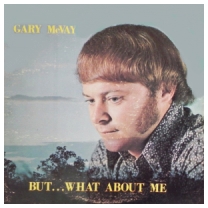 Gary McVay "But... What About Me?" (Sherwood Records, 19--?) (LP)
Gary McVay "But... What About Me?" (Sherwood Records, 19--?) (LP)
With his guileless, mopey album title, the hangdog expression and sideburn-adelic good ole boy looks, Alabama's Gary McVay was a ripe target for the ever-snarky social media Schadenfreude Patrol... So, yeah, sure, this album cover made the rounds on Tumblr and Pinterest, along with predictably vacuous, pointlessly cynical commentary. Hopefully by the time you read this, those companies will no longer exist, though I'm sure you'll still be able to find a copy of this record, if you just look hard enough.
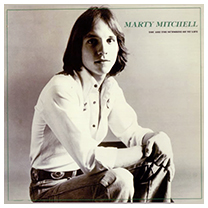 Marty Mitchell "You Are The Sunshine Of My Life" (MC Records, 1977) (LP)
Marty Mitchell "You Are The Sunshine Of My Life" (MC Records, 1977) (LP)
(Produced by Jerry Styner)
A predecessor to the better-known Curb label, MC Records was an odd, short-lived partnership between record mogul Mike Curb and Motown Records, which distributed the handful of albums that came out on MC. These discs had a notably generic, nondescript look, all but shouting out "tax writeoff," although this LP by Alabama-born singer Marty Mitchell actually did fairly well, fielding two singles, both covers of earlier pop hits. It kicks off with a ridiculously twanged-up, perky rendition of Stevie Wonder's "You Are The Sunshine Of My Life," a garish country cover which improbably hit the Top Forty, peaking out at #34. Mitchell's slightly countrified version of Frankie Valli's "My Eyes Adored You" languished in the Back Forty, however, and other AOR covers -- "You Light Up My Life," "How Can You Mend A Broken Heart," David Gates's "Make It With You" -- remained obscure album cuts. Of more interest are a couple of originals, "You Wind Up Being Blue" and "Virginia," as well as his covers of the Marty Robbins classic, "Devil Woman," and perhaps more surprisingly, of Linda Hargrove's "All Alone In Austin." This is an odd duck of an album -- some of the re-arrangements are outlandish, though mostly the record is pretty sedate, with some of the soft-pop covers being nearly indistinguishable from the original versions. As far as I know, this was Mitchell's only album, though I could be wrong about that -- it was certainly one of the commercial high points for the MC label.
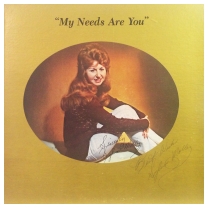 Sylvia Mobley "My Needs Are You" (Belle Meade Records, 19--?) (LP)
Sylvia Mobley "My Needs Are You" (Belle Meade Records, 19--?) (LP)
(Produced by Scotty Moore & Al Gore)
Way back in the early 1960s, Southern singer Sylvia Mobley (1941-2017) recorded several catchy, charmingly primitive latter-day rockabilly/country-twang singles, including one that was cut for Starday, and another for bandleader Gene Williams, down in her native state of Arkansas. She worked with Williams and other hard-country bandleaders such as Jimmy Haggett, and released a handful of 45s before cutting this LP sometime in the late '70s, an album that seems to be put together from a couple of sessions around 1975. Amid covers of oldies by Buck Owens ("Under Your Spell Again") and Slim Willet ("Don't Let The Stars Get In Your Eyes") are a half-dozen originals credited to Ms. Mobley -- a nice legacy for this little-known country gal! In the mid-1960s, Mobley was apparently a cast member of the Cotton Town Jubilee, a revue which was led by Gene Williams, and later worked as a tour bus operator for Gray Line Tours.
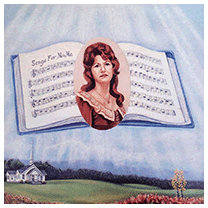 Sylvia Mobley "Songs For Mama" (Ray's Of Gold, 1984) (LP)
Sylvia Mobley "Songs For Mama" (Ray's Of Gold, 1984) (LP)
(Produced by Scotty Moore)
A nostalgic gospel set, with backing from some solid, A-list studio musicians, including D. J. Fontana on drums, Hoot Hester (fiddle), Willie Rainsford (piano), Larry Sasser (dobro) and Pete Wade on guitar. Along with a bunch of gospel standards ("Will The Circle Be Unbroken," "Life's Railway To Heaven," "If I Could Hear Mother Pray") are newer tunes such as "Mama" and "Can't You Remember."
 Eddie Moore "Moore Country" (Country International Records, 1982) (LP)
Eddie Moore "Moore Country" (Country International Records, 1982) (LP)
(Produced by Bud McGuire & Hurshel Wiginton)
Morris Edward ("Eddie") Moore (1950-2015) was a honkytonk singer from Millport, Alabama whose band played regionally and out of state; in later years, like many country artists, he shifted his focus to a music "ministry," playing gospel material instead of drinking songs. As far as I know this was his only album, and seems to have been a songwriter's demo set: several songs are credited to producer Bud McGuire, who probably bankrolled the record. At least one of the tunes on here struck gold: written by Billy Maddox and David Moore, "If Heaven Ain't A Lot Like Dixie" was later recorded by Hank Williams, Jr. on his High Note album, scoring a Top Five hit in 1987. I wasn't able to track down much info about Mr. Moore online, outside of his obituary and a defunct Facebook page.
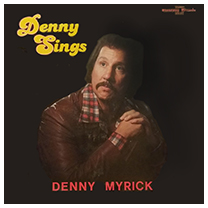 Denny Myrick "Denny Sings" (Stoneway Records, 1979) (LP)
Denny Myrick "Denny Sings" (Stoneway Records, 1979) (LP)
(Produced by R. M. Stone)
A businessman from Mobile, Alabama, singer Denny Myrick tried his hand at professional musicmaking, and even cut several singles throughout the 'Seventies, including some for "real" labels , including one for Musicor Records, way back in 1970. But like many before him, Myrick decided show business was more rewarding as a part-time gig, and stuck to his full-time gig in electrical engineering, or something like that. This LP was an atypical release for the Texas-based Stoneway label, which specialized in instrumental showcase albums, although Myrick had already recorded a bunch of singles for the label, dating back to '74. At any rate, Mr. Myrick is backed here by several hotshot pickers who had cut records for Stoneway themselves, including guitarist Danny Ross, fiddler Chubby Wise and steel player Bob Tuttle, as well as Robert Herridge ("the little fiddler," who worked at Gilley's nightclub and featured prominently in the movie Urban Cowboy.) The repertoire is heavy on country oldies, tunes like "Crazy Arms," "Faded Love" and "Invitation To The Blues," though there may be a few originals on here as well. A few tracks were also issued as singles, including "If I Had My Life To Live Over," which dated back to 1975, and newer recordings of "Ride On," and "Invitation To The Blues."
Denny Myrick "Sing, Denny, Sing" (Media Consultants, Inc./MCI Records, 1982) (LP)
(Produced by Lonnie Wright & A. V. Mittelstedt)
As far as I know, this was Denny Myrick's second full album, although he also self-released at least one CD, years later. In addition to the songs on this LP, he also released a single on MCI, with two songs not included here, "Making Believe Don't Make It So" and "Till I Stop Falling In Love." Myrick had a penchant for oldies, and most of the songs on here are covers, although there is one original by producer Lonnie Wright, and a newly-penned song by Curly Putnam ("I Should Be Doing This At Home.")
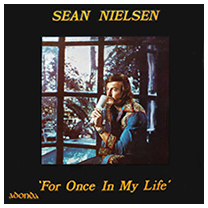 Sean Nielsen "For Once In My Life" (Adonda Records, 19--?) (LP)
Sean Nielsen "For Once In My Life" (Adonda Records, 19--?) (LP)
(Produced by Harrison Tyner)
Alabama native Sherrill "Shaun" Nielsen (1942-2010) sang in several well-known Southern gospel bands, notably with the Speer Family, The Statesmen and Jake Hess's Imperial Gospel Quartet... When Nielsen turned towards secular music, pop superstar Elvis Presley -- a longtime fan of Nielsen's religious singing -- brought him to Las Vegas and invited him to become part of his road show. This country-oriented album, which was recorded in Nashville, came out while Presely was still alive, so even though there's no release date, it's got to be pre-1977. (His name seems to be misspelled on the album jacket -- elsewhere, it's spelled "Shaun".) This album includes secular material, including covers of pop-vocals hits such as "Killing Me Softly," and "You've Lost That Loving Feeling."
Shaun Nielsen "The Songs I Sang For Elvis" (Adonda, 1980) (LP)
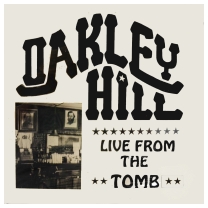 Oakley Hill "Live From The Tomb" (American Pie Records, 1980) (LP)
Oakley Hill "Live From The Tomb" (American Pie Records, 1980) (LP)
These Alabama good ole boys cover Hank Williams and Johnny Cash, but also play a bunch of originals, like "She Washes Dishes," "Alabama Outlaws" and "Alabama Honky Tonk." Sounds good, don't it? Oh, and they also cover the Lost Gonzo Band's "Dead Armadillo," which is a doozy of an outlaw novelty song. This was a live album, recorded at Lee's Tomb in Tuscaloosa, with Randy Branch (lead vocals and guitar), Bill Marshall (guitar), Mike Niblitt (bass) and Rusty Sharp on drums.
Clyde Owens -- see artist profile
Brenda Patterson -- see artist profile
Wayne Perdew "Wayne Perdew" (Artist's Recordings Company, 19--?) (LP)
(Produced by Jerry Brightman)
As a young man way back in 1959, Wayne Perdew (1932-2015) recorded a fat-toned rockabilly/r&b single called "Up Beam Baby," and kept himself in the Alabama music scene for years to come, most notably as the co-owner of Shirley and Wayne's Restaurant and Lounge in Mobile. His "all star" band played there for years, at least into the late 1980s, playing a mix of country and pop standards. As far as I know, these LPs were his only two albums; Mr. Perdew passed away in 2015 at age eight-two.
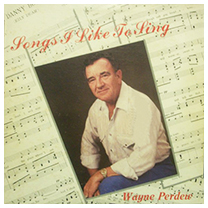 Wayne Perdew "Songs I Like To Sing" (Lynda Records, 19--?) (LP)
Wayne Perdew "Songs I Like To Sing" (Lynda Records, 19--?) (LP)
(Produced by Roger Holmes)
This album was recorded in Nashville with a professional crew that included musicians such as guitar picker Greg Galbraith, pedal steel player Doug Jernigan and pianist Benny Kennerson. Along with pop standards such as "Danny Boy" and "Mack The Knife," he also sings country hits like "There Goes My Everything" and "I'm Just And Old Chunk Of Coal," as well as an ode to his home state of Alabama, "Mobile."
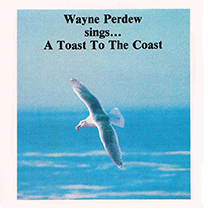 Wayne Perdew "...Sings A Toast To The Coast" (S & W Records, 19--?) (LP)
Wayne Perdew "...Sings A Toast To The Coast" (S & W Records, 19--?) (LP)
(Produced by Doyle Grisham)
I'm not sure about the provenance of this one... It seems to be from the 1980s and may have come out as a cassette-only release. Wayne Perdew sings a mix of country and pop standards, with backing by John Brust on bass, Bill Hullett (lead guitar), Doug Jernigan (pedal steel), Benny Kennerson (piano), Steve Nath (drums), Bruce Watkins on fiddle and guitar and fiddle, and the Carol Lee Singers singing backup. This was probably recorded in Nashville, but no details are given, including the date. John Brust, who is best known as a pianist is credited as playing bass, and was said to have joined the Wayne Perdew All-Stars band in 1987, so this may even be from as late as the early 1990s.
J. T. Perkins "Perkins Style Fiddling" (Davis Unlimited Records, 197-?) (LP)
A championship fiddler from Alabama, J. T. Perkins recorded several albums and was in the orbit of the instrumentally-oriented Davis Unlimited bluegrass label.
Pete & Anthony "Fire Tower Mountain" (Commercial Distribution Corporation, 1978-?) (LP)
(Produced by Rick Bracy & Johnny Erdelyan)
Yeah, sure, this was recorded in Nashville with a bunch of studio pros from the country scene -- Dave Kirby on lead guitar caught my eye -- but it turns out this was more of an indulgent, emotive loner-rock flight of fancy, and less of a twang thang. Anyway, I couldn't quite get into it, but it does seem to fit in here, on some level. The duo's full names were Pete Nice and Anthony Crawford and they wrote or co-wrote all but one of the songs on here, the exception being Herb January's "For That Summer." Still, regardless of my twang snobbery, these guys did okay, particularly Mr. Crawford who wrote a few hundred songs, many of which were recorded by top artists in the '80s and '90s, and also worked as a sideman for top-tier artists such as Vince Gill and Dwight Yoakam, and even pop stars such as Nicolette Larson and Steve Winwood. I think these guys were originally from Birmingham, Alabama; Pete Nice didn't leave quite as large a footprint as Crawford, though I think they continued to collaborate off and on over the years.
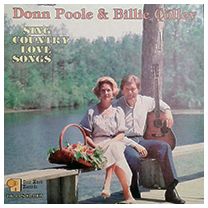 Donn Poole & Billie Collie "...Sing Country Love Songs" (Door Knob Records, 1981)
Donn Poole & Billie Collie "...Sing Country Love Songs" (Door Knob Records, 1981)
(Produced by Gene Kennedy & Bil Vorndick)
All-original material, with all songs co-written by Billie P. Colley and Donn Poole. Not a lot of info on this duo... They were from Mobile, Alabama and went to Nashville to record with Gene Kennedy's studio crew, which included Russ Hicks on steel guitar, Roger Morris (piano), Cliff Parker (lead guitar), Jack Ross (bass), John Stacy (drums) and Charlie Vaughn on guitar. These two were not a couple, as they mention the support of their loving husband and wife, respectively... I get the sense they might have been performing together for several years before they cut this album, but I couldn't find any info about them online, so perhaps this was strictly a just-for-fun kind of session.
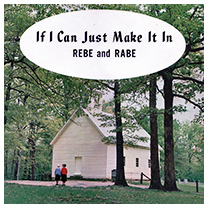 Rebe And Rabe "If I Can Just Make It In" (Linda Records, 19--?) (LP)
Rebe And Rabe "If I Can Just Make It In" (Linda Records, 19--?) (LP)
(Produced by Kenny Wallis)
Revin "Rebe" Gosdin (1924-1978) and Auburn J.C. "Rabe" Perkins (1923-2005) were an old-timey gospel duo from Alabama, modeled on the Blue Sky Boys and the Louvins. The pair met while working in a local cotton mill, and began performing professionally in the 1930s and '40s. For many years they had a show on radio station WVOK, Birmingham as well as on WBAM in Montgomery, where Gosdin also had a day job in the early 1960s. They recorded prolifically for a while, but gradually gave up their music career, several years before Gosdin passed away; an early 'Seventies reunion included an appearance at Bill Monroe's fabled Bean Blossom Festival. This album includes Rebe Gosdin on mandolin and Rabe Perkins on guitar, as well as Wayne Cobb Jr. (drums), Buddy Davis (guitar), Junior Maharrey (bass) and John Probst playing piano. (Also of note is Gosdin's nephew, Vern Gosdin, who became a chart-topping country star in 1970s and '80s.)
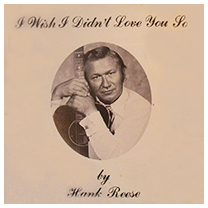 Hank Reese "I Wish I Didn't Love You So" (Buckeye Records, 19--?) (LP)
Hank Reese "I Wish I Didn't Love You So" (Buckeye Records, 19--?) (LP)
(Produced by Hank Reese)
Indiebilly from Daleville, Alabama, a tiny town in the Southeastern end of the state, near the Florida border... Reese was originally from Georgia, but later moved to the heart of Dixie and was playing here with a largely local band, including fiddler Murrell Counts, Tommy Cozart on drums, Tommy Floyd (bass), Benny Kennerson (piano), Glen Ray McWhort (steel guitar) and Jack Solomon on lead guitar... The repertoire is almost all cover songs -- real oldies like "Cattle Call," "Shotgun Boogie," "Devil Woman" and "The Gods Were Angry" -- with one tune credited to Hank Reese, "I'll Still Be Waiting." No date on this one, but I'd guess late 1970s, just from the look of it.
Lawrence Reynolds - see artist profile
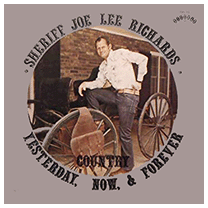 Sheriff Joe Lee Richards "Country: Yesterday, Now And Forever" (Richmar Records, 1977) (LP)
Sheriff Joe Lee Richards "Country: Yesterday, Now And Forever" (Richmar Records, 1977) (LP)
(Produced by Charlie Louvin)
A real-deal, country singin' cop... Before working in law enforcement, Joe Lee Richards (1935-2013) was an ironworker by trade, as well as a truck driver and radio deejay at various point sin his life. He entered police work in the Benton City police department, moving on to the State Police, where he spent most of his career, eventually becoming the sheriff of Saline County, where he grew up. He cut this album with a bunch of Nashville cats, professional pickers like Johnny Gimble, Buddy Spicher, Buddy Harmon, as well as Charlie Louvin, who arranged and produced the album... Pretty impressive crowd, if you ask me!
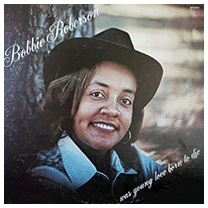 Bobbie Roberson "Was Young Love Born To Die" (Bolivia Records, 1979) (LP)
Bobbie Roberson "Was Young Love Born To Die" (Bolivia Records, 1979) (LP)
(Produced by Paul Douglas, Mike Tracy & Randy Stutler)
An African-American gal from Brewton, Alabama, Bobbie Roberson sang both country and soul music, with a distinctive voice that fit perfectly into both genres. Around 1969, she met her husband Franklin Edwards while living in New York City and joined his soul band called The Founders, which also recorded on the Bolivia label. They worked in New York for about five years before she decided to return to the quiet rural life of her hometown, and it was a few years later while on a trip to nearby Pensacola that she was recruited by a local promoter to cut an album of country stuff, music she listened to and sang as a child, and had a deep affinity for. She's backed by Randy Harper on piano, Dan Lang (guitar), Tammy Odom (bass), Andrew Shelnut (drums), Buzz Stutler (violin) while Jerry Wallace provides some particularly solid backing on steel guitar. Ms. Roberson made a few waves at the time, traveling to Nashville and performing at the Grand Ole Opry, though ultimately the record failed to break through nationally. In addition to this album, she released a string of singles between 1979-81 under her own name, some were soul tunes while others were solid country tracks. And as many country (and soul) singers before and since, she turned to the church in later years and
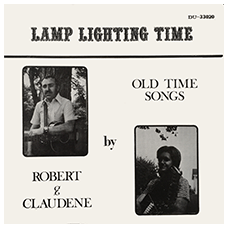 Robert & Claudene "Lamp Lighting Time" (Davis Unlimited, 1975) (LP)
Robert & Claudene "Lamp Lighting Time" (Davis Unlimited, 1975) (LP)
(Produced by Steve Davis & Robert E. Nobley)
This is one of my favorite old-timey albums, a battered but beloved memento of the days when dollar albums still only cost a quarter (or five for a dollar, if you were lucky...!) The husband-and-wife team of Robert and Claudene Nobley were just plain folks from Roanoke, Alabama who loved all kinds of old-timey music, and they regularly went to festivals and shows with Steve Davis, the guy who started the Davis Unlimited label. Thank goodness he stuck them in front of a microphone, because the Nobelys are just so heartfelt, soulful and sincere singing these old tunes, with simple, no-muss/no fuss guitar picking and autoharp strumming. Their harmonies are plainspoken but effective, and they really bring these old songs to life, tunes like "Poor Willie," "Katie Dear," All The Good Times Are Passed And Gone" and, of course, "Lamp Lighting Time," which is an album highlight. If you love those old records by the Blue Sky Boys, Delmore Brothers and Louvin Brothers, you might want to track this one down as well.
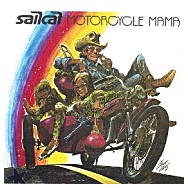 Sailcat "Motorcycle Mama" (Elektra Records, 1972) (LP)
Sailcat "Motorcycle Mama" (Elektra Records, 1972) (LP)
(Produced by Pete Carr)
Quintessential one-hit wonders, Sailcat was a band formed by two veterans of the Alabama rock-soul scene, John Wyker and Court Pickett, along with a bunch of Muscle Shoals-ian hired hands. The album is a mix of soft Southern rock and even softer, airy acoustic prog, with a teeny bit of twang, though the country-rock association is pretty iffy... The title track was almost a Top Ten hit, but the band broke up shortly after the album came out -- but Southern rock fans looking for something a bit mellower than usual might like this one. The original LP is also notable for the album art by Mad magazine cartoonist Jack Davis, who provided the front cover and a big spread in the gatefold that illustrates the album's supposed "concept," of an Easy Rider-lookalike biker who first dreams of, then hooks up with an ideal hippie-biker babe. At first things are wild and wooly, then they spend time apart, and then we see them singing onstage at the Opry, and finally motorcycle dude is kicking back on his front porch, living the quiet life at last. Not bad for a jam-band record that's half-instrumentals!
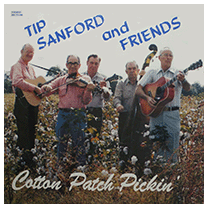 Tip Sanford & Friends "Cotton Patch Pickin' " (Bow Records, 19--?) (LP)
Tip Sanford & Friends "Cotton Patch Pickin' " (Bow Records, 19--?) (LP)
(Produced by John Fletcher & Ken Pritchett)
Real-deal, old-timey fiddling by Northport, Alabama's Floyd "Tip" Sanford, who competed and placed in numerous competitions in the South. He's backed here by locals Gordon Galbreath (guitar), A. D. Hammer (bass), Bryce Johnson (guitar), and Warren Sellers on mandolin. It's not clear whether he had a regular band, though Mr. Sanford was still competing in music contests as recently as 1999, although he is mentioned in his brother Ivy's 2003 obituary as having already passed away.
 Dale Sellers "Christmas Guitars" (Gusto/Power Pak Records, 1974-?) (LP)
Dale Sellers "Christmas Guitars" (Gusto/Power Pak Records, 1974-?) (LP)
(Produced by Tommy Hill-?)
A holiday set from one of the most prolific Nashville studio musicians of the 1970s... Most of the songs are from non-country sources, though one track, Lassaye Homes's "Christmas In My Hometown" was originally recorded by Charley Pride, and later covered by Randy Travis and several other artists. Not sure of the date on this one, but I'd guess somewhere around 1973-74, based on the other Power Pak albums advertised on the back cover.
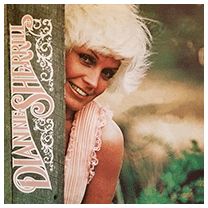 Dianne Sherrill "Dianne Sherrill" (NCP Records, 1976) (LP)
Dianne Sherrill "Dianne Sherrill" (NCP Records, 1976) (LP)
(Produced by Jim Vest & Mark Sherrill)
This was the lone solo album for singer Dianne Sherrill, though she also cut a few singles for the Monument label. Originally from Alexander City, Alabama, Sherrill came to Nashville in 1970, performed on Hee Haw and later on TNN. She also worked as a vocal coach, backup singer, etc., and became born again at some point... Gospel music seems to have become her sole focus after that, including gigs with legacy groups such as The Florida Boys. This decidedly secular album features a bunch of cover tunes, stuff like "Hey Good Lookin'," "Storms Never Last," "Silver Threads And Golden Needles," and "Stand By Your Man," with backing by Music City pros such as Willie Rainsford, Buddy Spicher and Jim Vest, as well as several less well-known session players.
 The Shooters "The Shooters" (Epic Records, 1987)
The Shooters "The Shooters" (Epic Records, 1987)
(Produced by Walt Aldridge)
A short-lived pop-country band from Alabama, the Shooters grazed the lower rungs of the Top 40 with a quick series of singles, and two albums of workmanlike country-pop, a sleek mix of harmony-rich, somewhat too-smooth material with a familiar, comfortable sound. Some songs are in a group-vocals, Shenandoah-esque style, though there are misfires like the distinctly un-country soft-rock of "Tell It To Your Teddy Bear." Personally I find the glossy production a bit sluggish and sterile, and they drift too easily into gooey mainstream '80s pop or the Dan Fogelberg/Dan Seals variety. But for many fans of '80s country, these guys might be a pleasant surprise, a now-obscure band that matched many bigger stars in their scope and talent. Bandmember Walt Aldridge had previous success as an early '80s songwriter; eventually becoming better known as a record producer, which he does here as well...
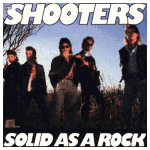 The Shooters "Solid As A Rock" (Epic Records, 1989)
The Shooters "Solid As A Rock" (Epic Records, 1989)
(Produced by Walt Aldridge)
This album provided them with their biggest hit, a tune called "Borderline," which fell short of the Top Ten. After the Shooters broke up, bass player Gary Baker concentrated on songwriting, releasing an album with his musicmaking buddy Frank Myers, penning several big hits such as "I Swear," a chart-topper for John Michael Montgomery that also briefly crossed over into the Pop charts.
 Southbound "A Little Bit Of..." (Music City Records, 1979) (LP)
Southbound "A Little Bit Of..." (Music City Records, 1979) (LP)
(Produced by David A. Praet & Mildred S. Hammonds)
Frank Hardy, Andy Pollard and the wonderfully-named Lobo Loggins were the three youthful lead singers for this twang band out of Anniston, Alabama, with pedal steel added by a guy named Travis McCurley, who looks like he might have been a few years their elder. They cover some country stuff -- songs by David Allan Coe, Larry Gatlin and others -- but also play some of their own songs. Included are Hardy's "Broken Man," "Lovin' You A Little," by Loggins, and "Simple Man," by Pollard, as well as a few other songs that look like originals, but aren't credited to anyone in the band. They look like such nice young men!
Southbound Glory "Stop, Look And Listen" (Raven Records, 1982) (LP)
(Produced by Steve Clayton, Bill Fowler & Jerry Wise)
Southbound Glory "It's About Time" (Raven Records, 1982) (LP)
(Produced by Steve Clayton & Jerry Wise)
Steel City Band "Steel City Band" (?) (LP)
This was an obscure twang band from Alabama, not to be confused with the obscure funk group from Ohio of the same name...
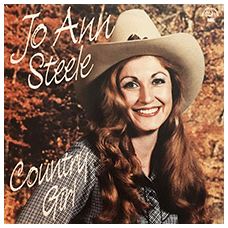 Jo Ann Steele "Country Girl" (Bulldog Records, 1984) (LP)
Jo Ann Steele "Country Girl" (Bulldog Records, 1984) (LP)
(Produced by George Richey, Marty Robbins & Billy Sherrill)
This one's a bit of an oddity for the British-based Bulldog label, which usually served as a cheapie reissue imprint for odds-and-ends collections of established American country artists. In this case the material is still reissued, though from a variety of sources -- mainly old singles -- but from a gal who seems to have kicked around at the edges of fame for a long time, without a complete LP of her work until this set came together, several years after she'd left the scene. Jo Ann Steele (1948-2008) was originally from rural Alabama, and came to Nashville in the 1960s as the then-wife of Eddie Crandall, a producer and talent scout who worked closely with Marty Robbins. Robbins was one of several high-profile industry movers and shakers who took a swing at making Steele a household name, along with Pete Drake, Billy Sherrill and finally George Richey in the late 'Seventies. She initially seems to have been pitched as one of the late '60s girl-group tinged gal singers such as Norma Jean or Connie Smith, to whom she shares more than a passing vocal similarity. Alas, while this album gathered a bunch of her more obscure recordings, her best-known singles are missing from the list, which is a shame, since future collections seem a little unlikely. One track, "Bits And Pieces," is credited to Jo Ann Steele, though others seem to have been songwriters demos for folks such as Bobbie Jayden, who wrote several tracks on here.
 The Stinson Brothers "In Las Vegas" (Canadian American Records, 1964-?) (LP)
The Stinson Brothers "In Las Vegas" (Canadian American Records, 1964-?) (LP)
Charmingly uneven mostly-country material from a family band better known for their rockabilly and teenpop recordings of the late 'Fifties. Bob, Ray and Ronnie Stinson were the oldest brothers in a large family... Originally from Decatur, Alabama, they were Minnesotans by the time their music careers took off, though they toured widely and (as this album confirms) also did their time in Vegas. The material seems to be mostly original, and their sound is certainly unusual, a mix of hillbilly and Kennedy-era pop, with vocals that hint at both Everly Brothers-style and Sons Of The Pioneers-ish harmonies. Perhaps most surprising is the rough-hewn quality of the production, especially considering their prior experience in the studio -- not quite slapdash, but certainly less polished than many country records of the era. They certainly sound authentic and genuine; a real working band still giving it a go.
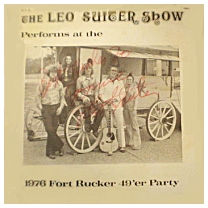 The Leo Suiter Show "...Performs At The 1976 Fort Rucker 49'er Party" (Happy Valley Records, 1976) (LP)
The Leo Suiter Show "...Performs At The 1976 Fort Rucker 49'er Party" (Happy Valley Records, 1976) (LP)
Leo Suiter was an old-timer from Daleville, Alabama who kept his band together for several decades, barely scraping by after quitting his day job as a flight instructor for the state of Alabama. While doing research on these albums, I came across some documents from a 1990 tax evasion case, where the IRS mercilessly raked the old guy over the coals, despite the fact he'd only been making peanuts -- an income barely in the thousands -- for over a decade. (Apparently Mr. Suiter supplemented his music income by a little side action with some off-the-books vending machines... and the authorities tend to frown on that sort of thing.) Anyway, depressing as it is, the court case offers a very revealing look at the economic realities faced by independent working musicians who really try to make a go of it. And it's not a pretty picture... I guess he made a handful of albums, including several cassette-only releases -- when he made this one he was woking with a pretty youthful, longhaired band... The music is raggedly amateurish, but enthusiastic, and a nice snapshot of a DIY twang band, plugging away with all their heart.
Leo Suiter "Live" (Gold Ring Records, 1976) (LP)
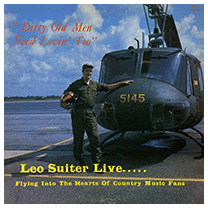 Leo Suiter "Dirty Old Men Need Loving' Too: Leo Suiter Live..." (Happy Valley Records, 1978) (LP)
Leo Suiter "Dirty Old Men Need Loving' Too: Leo Suiter Live..." (Happy Valley Records, 1978) (LP)
(Produced by Leo D. Duggers & Vic Gabany)
This seems to be a songwriter's demo set, with Mr. Suiter recording in Nashville, backed by a bunch of studio pros such as guitarist Jimmy Capps, bassist Billy Linneman, Leon Rhodes (guitar), Harold Rugg (steel guitar), Jerry Whitehurst (piano), and backup singers who included Sudie Baker and Rita Figlio. Jimmy Helms is listed as the session's "leader", and contributed four original songs to the set (along with two from Damon Black, and a couple others from writers also signed the the Sure Fire publishing company, including Billy Arr and Glenn Johnson) as well as a couple on Cedarwood. The album closes with a late-vintage Wayne Walker song, "Wichita Town," which bodes well for honkytonk fans. The front cover shows Mr. Suiter decked out as a helicopter pilot, and the liner notes explain that he had been a WWII prisoner of war, having been captured at the Battle Of The Bulge, and that after the war, he started a career as a helicopter flight instructor. The photo may have been an old memento, though, since earlier on he'd said he quite that job to pursue his dreams of country music stardom.
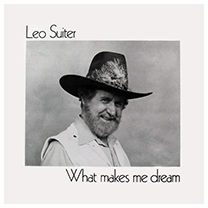 Leo Suiter "What Makes Me Dream" (Gold Ring Records, 1982) (LP)
Leo Suiter "What Makes Me Dream" (Gold Ring Records, 1982) (LP)
(Produced by Chris Goldring)
One might suspect this United Kingdom release of being a reissue of stuff that came out in the States first, but apparently it was all recorded at EQ Studios, in Watford, England. The studio crew included John Hamilton (bass, guitar and keyboards), John Mitchell (bass), Roger Rettig (lead guitar and pedal steel), and Jimmy Slattery on drums, backing Mr. Suiter on a set that includes three originals penned by producer Chris Goldring ("Mama," "There's A Shadow On My Shoulder" and "What Makes Me Dream") along with several covers of contemporary American country hits such as "Elvira," "I'd Love To Lay You Down" and "Mountain Music."
J. T. Swinney/Various Artists "It's Our Old Opry House" (Artom Records, 1975) (LP)
(Produced by Kenny Wallis)
This appears to be kind of a song-poem vanity album wherein Mr. Swinney -- who wrote all the lyrics -- only sings on one song. The other tracks are performed by John Campbell and Othell Sullivan...Sullivan (1931-2017) was an early 'Sixties rockabilly singer and Birmingham, Alabama area radio deejay, working on stations including WEBZ and WVOK. Sullivan led a band called the Southern Allstars; I'm not sure if any of the guys in his band backed him here. Mr. Swinney had been copyrighting his songs through the Artom publishing company at least as early as 1964; a single on Artom featuring Othell Sullivan and Joe Rumore (both singing Swinney's material) is dated to 1966, though this album came out about a decade later. Details on both Swinney and Artom are pretty scant
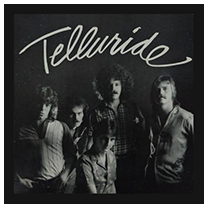 Telluride "Telluride" (Lizardhead Records, 1981) (10" LP)
Telluride "Telluride" (Lizardhead Records, 1981) (10" LP)
(Produced by Johnny Sandlin)
Not a ton of information about these guys, though I guess they were more of a rock band, and less about the twang. Despite the name, they were not from Colorado, but rather from Mount Brook, Alabama, near Birmingham, and they had kind of a southern-rock flair. The group included Rick Carter on guitar and vocals, Robert Churchill (drums), Kevin Derryberry (piano), Moore Harrell (electric guitar), and Scott Walker on bass. Apparently these guys partied hearty, back in the day. They included a song called "Sensimilla" on this album and pianist Kevin Derryberry became a born-again minister after struggling for years with alcoholism and drug abuse; part of his personal testimonial includes his description of his wake-and-bake rock'n'roll lifestyle, back when he was young. As far as I know this was the group's only record.
Gordon Terry & The Tennessee Guitars "Disco Country" (Plantation Records, 1977) (LP)
(Produced by Royce Clark)
Alabama fiddler Gordon Terry (1931-2006) cut his teeth playing in Bill Monroe's bluegrass bands of the 1950s, branching out into honky tonk and rockabilly recordings, and later became well-known for headlining some early 'Sixties major-label square dance records. From his early hillbilly roots he made it all the way into the disco era and cut this slick set, including "disco" versions of classics such as "Orange Blossom Special" and "Tennessee Waltz." Scary, sure, but you can still get into it.
Gordon Terry & The Tennessee Guitars "Tennessee Hot Rock" (Plantation Records, 1979) (LP)
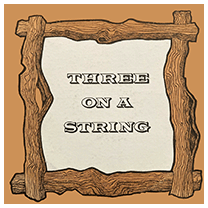 Three On A String "Three On A String" (Sound Of Birmingham, 1977-?) (LP)
Three On A String "Three On A String" (Sound Of Birmingham, 1977-?) (LP)
(Produced by Don Mosley)
But, wait... there's four of them! That's confusing. Well, anyway, this was the first album by these four (three?) fresh-faced lads from Birmingham, Alabama -- Joe Estes (bass), Bobby Horton (banjo), Jerry Ryan (guitar), and Terry Ryan on guitar and mandolin. They had been playing together off and on at local coffeehouses and more informal venues for about six years before they recorded this private-pressser, which shares the same generic fence-post clip-art cover with countless other low-budget records. They went on to cut several other, somewhat slicker-looking albums (see below), though this was their first time in the studio together. The repertoire was mostly bluegrassy, but includes covers of John Prine's "Blow Up Your TV," Steve Goodman's "City Of New Orleans," "The Night They Drove Old Dixie Down" and Dick Feller's "Some Of Shelley's Blues," a nice cross-section of 'Seventies singer-songwriter and roots music gems. The liner notes helpfully inform us that the group included "a school teacher, a computer programmer, and a former road musician," and while I still wonder about the fourth guy, I do have to wonder if the computer guy stuck it out and made a bundle in the '80s when computer science really took off.
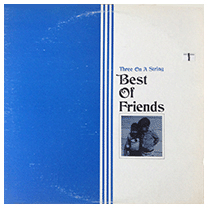 Three On A String "Best Of Friends" (RPI/Ryan Productions, 1979) (LP)
Three On A String "Best Of Friends" (RPI/Ryan Productions, 1979) (LP)
(Produced by Glen Wood)
Wait... now there's five of them! This jugband-y, folkie crew from Birmingham, Alabama changed their lineup for this album -- brothers Jerry and Terry Ryan seem to have kept the band going while Horton and Ryan moved on. The "three" man lineup now added Gordon Burt on fiddle, mandolin and flute (uh-oh), along with Bobby Horton playing banjo, dobro and trumpet (wait, what?) and Andy Meginniss on bass and kazoo (hey, no problem there!). Lighthearted, eclectic stuff that includes several traditional tunes, a Johnny Cash cover ("I Still Miss Someone"), Billy Edd Wheeler's "Coal Tattoo," while the flipside of the album is packed with several originals penned by various members of the band. Possibly most telling is their cover of a Red Clay Ramblers song ("The Ace") which may give the best indication of where they were headed with this group -- kinda bluegrass-y, but with deep roots spreading out in several directions. The group has stuck together (with an evolving membership) more or less continuously since 1971, and even has a robust online presence.
Three On A String "Going Places" (1981)
(Produced by Tony Wachter)
Another lineup change, this time with Jerry Ryan keeping things going, Gordon Burt still on board and Bobby Horton back in the mix. The biggest shift, though, is that they headed over to Nashville to do things up right, booking a session with some real heavyweight players, studio pros such as Vic Jordan, Terry McMillan, Weldon Myrick, Hank Strzelecki and Pete Wade to beef up their sound. That's a lot of firepower! If anything, the repertoire is even more diverse than before, with only a little straight-up bluegrass, a lot of contemporary folk (songs by Hugh Moffett and Michael McGinnis) and some Tin Pan Alley oldies, like Georgia On My Mind" and "Chattanooga Shoe Shine Boy," and even a cover of Neil Diamond's "I'm A Believer." A nice final hurrah.
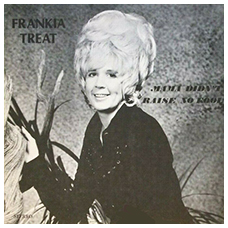 Frankia Treat "Mama Didn't Raise No Fool" (Champion Records, 19--?) (LP)
Frankia Treat "Mama Didn't Raise No Fool" (Champion Records, 19--?) (LP)
Arkansas native Frankia Wynonna Treat (aka Franki Treat, 1943-2012) was a regional performer who recorded a few indie records and in 1975 she cut a single for Capitol Records, with Buck Owens as her patron. Owens also hired her as a writer for his publishing company, and although her own career as a performer didn't go that far, Treat had some real success as a composer. One of her songs, "Last Night I Laid Your Memory to Rest," was included on John Anderson's 1992 comeback album, Seminole Wind. She released some singles on her own label, Treat Records, and this album seems to draw on those recordings, although it may have been released much later, possibly in the early '80s. It includes a wealth of original material -- seven songs written by Ms. Treat and two more by her husband Lonnie Treat, along with covers of "Son Of A Preacher Man" and "My Shoes Keep Walking Back Top You." Their son, Mason Treat (1963-2013) also was musician, playing drums for Top 40 star John Anderson.
 Franki Treat "Stranger" (Champion Records, 19--?) (LP)
Franki Treat "Stranger" (Champion Records, 19--?) (LP)
(Produced by Harold Bradley & Bobby Bradley)
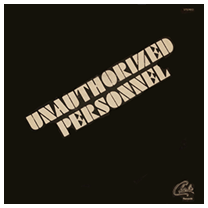 Unauthorized Personnel "Unauthorized Personnel" (Charlie Records, 1976-?) (LP)
Unauthorized Personnel "Unauthorized Personnel" (Charlie Records, 1976-?) (LP)
Mid-'Seventies pop and twang by a band that seems to have been from around Birmingham, Alabama. The group included Peppy Daffron on banjo and guitar, John Gleysteen (fiddle and keyboards), Ted Klefisch (bass), Debbie Lynn (lead vocals), and drummer Tony Ruka. Side One of the album is all originals, while Side Two includes covers of "Operator" "Orange Blossom Special" and Mickey Newberry's "American Trilogy" medley. Some of the band's songs were co-written by Susan Gleysteen, who doesn't seem to have been in the band, while "Peppy" Daffron may have been Kathryn Daffron (1952-2009) whose obituary tagged her as "a well known local entertainer," and who was apparently the sister of novelty songwriter Roger Hallmark. There's not a lot of info about these folks online, but they definitely played some country stuff. This seems to have been their only album.
Dale Watson -- see artist profile
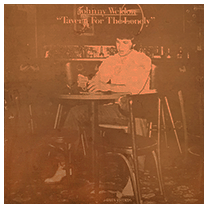 Johnny Weldon "Tavern For The Lonely" (Raven Records, 1980) (LP)
Johnny Weldon "Tavern For The Lonely" (Raven Records, 1980) (LP)
(Produced by Steve Clayton, Jim Crisp & Jerry Wise)
A country crooner born and raised in Wetumpka, Alabama, just north of Montgomery, Johnny Wayne Weldon (1953-2007) plugged away for decades on the local music scene, starting back in his high school days. Over the years he led a few different groups, including one called Southern Freight, as well as the lineup on this album, which he called The Magnum Band. Along with Mr. Weldon on vocals, the group included Ray Goss (bass), David Jackson (guitar), Richard Knight (drums), Nancy Simmons (keyboards and vocals) and Tommy Wilson on keyboards. This album is packed with original material, including the anthemic "Nashville Didn't Want Me," which was co-written by producer Steve Clayton, and locally oriented tunes such as "Alabama Clay." Though this album has kind of a honkytonk flair, a couple of years later Weldon had settled into a mellower, ballad-oriented style, which suited the lounge work he was doing with Southern Freight (a band which had a completely different lineup). For a while he hung up his spurs and put his own career on hold, taking a gig as a driver and roadie for Top Forty star T. G. Sheppard, who was a longtime friend. At some point Weldon headed back home and was playing local shows as recently as the early 2000s, not long before he passed away. As far as I know this was his only album.
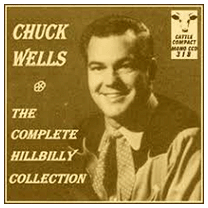 Chuck Wells "The Complete Hillbilly Collection" (Cattle Records, 2006) (LP)
Chuck Wells "The Complete Hillbilly Collection" (Cattle Records, 2006) (LP)
A 'Fifties honkytonker who was born in Alabama but made his name down in Texas. Chuck Wells (1922-1997) cut discs for Columbia and King Records as well as numerous smaller indies and recorded plenty of straight-up country weepers as well as a few over-the-top novelty numbers, like his early 'Sixties melodrama, "Down And Out," which has been featured on a compilation album or two...
Woolvin James "Lonely Night" (Raven Records, 1981) (LP)
(Produced by Steve Clayton & Jerry Wise)
Not actually a person, the band called Woolvin James came from the merger of two Florida groups, The Doc Holiday Band (from Jacksonville) and The Shag Band (out of Sarasota) which merged together in 1980. They soon got a gig as the house band at a club in Dothan, Alabama called The Cowboy, which is where they were working when they cut this album, augmented in the studio by a couple of guys from the Raven label. The lineup includes John Rainy Adkins on bass, Donny Clayton (guitar), Steve Clayton (piano), Ronnie Lee (guitar), Tommy McAllister (steel guitar), Jimmy Ringo (guitar), and bassist Dan Sheffield, along with several different drummers. Most of the songs are credited (mysteriously) to a J. Broun, with one track, "Sunshine," co-written by the Claytons, and one song, "The Party's Over," penned by Bill McCorvey, who would later become the lead singer of the '90s top forty band Pirates Of The Mississippi.
Various Artists "GENE WILLIAMS COUNTRY JUNCTION SHOW" (Erwin Records, 1967-?) (LP)
(Produced by Junior Bratcher)
Country impresario Gene Williams grew up in Dyess, Arkansas, but made his name in Memphis, just on the other side of the Mississippi River. In 1963 he was given his own weekly television slot, The Gene Williams Country Junction Show, on local television station KAIT, in Jonesboro. The popular program was swiftly syndicated throughout the South, and eventually was broadcast on nearly two hundred stations nationwide. This souvenir album showcases the 1966-67 cast, which included gal singer Lynne Burns, along with steel player Jim Roby, Smithville local Alton Yancey and singer Johnny Duncan (who's not to be confused with the Texan of the same name who became a chart-topper in the late 1970s...) Later on the show attracted veteran country and rockabilly performers such as Bill Carlisle and Warren Smith, and Williams plugged away for decades in a variety of markets.
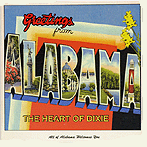 Various Artists "GREETINGS FROM ALABAMA, THE HEART OF DIXIE" (Bear Family Records, 2004)
Various Artists "GREETINGS FROM ALABAMA, THE HEART OF DIXIE" (Bear Family Records, 2004)
Bear Family's loopy series of travelogue compilations continues with this entry from the home state of Hank Williams... It's actually not the strongest disc in this series, but it still has some gems, and gathers classics such as "Alabama" by the Louvin Brothers alongside rockabilly, hillbilly and country-folk rarities, all singing the praise of "the Heart of Dixie." The inclusion of two tunes by jump blues bandleader Louis Jordan seems a little incongruous (although there is also a strong strain of Dixieland and minstrel-show blues in many songs, a hangover, no doubt, from the Depression-era success of "Alabamy Bound...") One big disappointment is that they don't include the Lynyrd Skynyrd original recording of "Sweet Home Alabama," opting instead for a gooier version by... you guessed it... Alabama. It's also too bad they didn't include "Boulder To Birmingham," by native Alabamian Emmylou Harris... I imagine those two songs were a little too expensive to get the rights for, but it still woulda been nice to hear them here. Anyway, this set is okay, but others in this same series are much stronger.
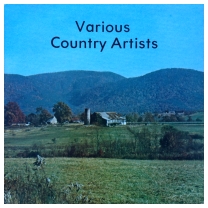 Various Artists "VARIOUS COUNTRY ARTISTS" (Woodrich Records, 1977-?) (LP)
Various Artists "VARIOUS COUNTRY ARTISTS" (Woodrich Records, 1977-?) (LP)
(Produced by Woody Richardson & R. C. Smith)
Well, you certainly have to admire the simplicity and directness of the album title. Also the music. This ultra-obscuro collection is a completely unpretentious, rewarding set of low-key performances of regular-folk locals from Lexington, Alabama, deep in the heart of Muscle Shoals territory. The album opens with a couple of tracks by Jerry Gallien who gives a convincing impersonation of Merle Haggard on "I Met A Friend Of Yours Today," as well as a good cover of "Mamas Don't Let Your Babies Grow Up To Be Cowboys." Backing him on both tracks is dobro player James Kimborough, who would go on to release several albums of his own, with the help of the German-based Cattle label in the 1980s. Next up is Ms. Polly Holder, who the liner notes inform us "seems to be as much at home in front of a microphone as she does in her own kitchen." Jinkies! What a gal! Well-meaning sexism aside, she's one of the highlights of the album, singing two lovely songs in an old-fashioned sentimental style that recalls the heyday of '40s heartsongs. Another gal, Martha Thompson, takes on more contemporary material, singing a sluggish version of "I'm Not Lisa," followed by "I Love Charlie Brown." This brings me to the sad admission that, maybe, not all these performances are really all that great, although I still find them charming and think this record is an excellent reflection of amateur musicianship in its most disarming and direct incarnation. Side Two closes with a couple of gems, two oldies sung by "relative newcomer" Dick Robertson, who sings in a relaxed, middle-aged drawl, with Kimborough backing him on a lively version of Hank Snow's "Golden Rocket." Sweet stuff -- I wouldn't trade it for a whole mountain of Tim McGraw records!
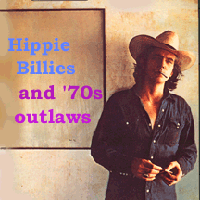 Locals Only: Alabama Twang This page collects artist profiles and record reviews of country music from the state of Alabama. It's part of a larger guide to unsigned and off-the-radar regional artists from years gone by, which is also part of the even larger Guide To Hick Music on Slipcue.com. Most of the artists here are little-known locals, bar-band singers, etc., but the list also includes Nashville stars who were from the state, as well as some bluegrass and gospel artists, etc. This is an ongoing project, with new stuff coming in all the time, and we welcome any recommendations, additions or corrections.
Locals Only: Alabama Twang This page collects artist profiles and record reviews of country music from the state of Alabama. It's part of a larger guide to unsigned and off-the-radar regional artists from years gone by, which is also part of the even larger Guide To Hick Music on Slipcue.com. Most of the artists here are little-known locals, bar-band singers, etc., but the list also includes Nashville stars who were from the state, as well as some bluegrass and gospel artists, etc. This is an ongoing project, with new stuff coming in all the time, and we welcome any recommendations, additions or corrections.
 Tony Alamo "Susan, I Love You So Much, It Hurts Me... Love, Tony" (Alamo Records, 197-?).(LP)
Tony Alamo "Susan, I Love You So Much, It Hurts Me... Love, Tony" (Alamo Records, 197-?).(LP)
 Tony Alamo "...Sings Love Songs For Sue... And You" (Alamo Records, 197-?).(LP)
Tony Alamo "...Sings Love Songs For Sue... And You" (Alamo Records, 197-?).(LP)
 Tony & Susan Alamo "Mister DJ" (Alamo Records, 1977).(LP)
Tony & Susan Alamo "Mister DJ" (Alamo Records, 1977).(LP)
 Bob Alday "Alabama's Real Country Sound" (1982) (LP)
Bob Alday "Alabama's Real Country Sound" (1982) (LP)
 Ava Aldridge "Frustrated Housewife" (MGM Records, 1975) (LP)
Ava Aldridge "Frustrated Housewife" (MGM Records, 1975) (LP)
 Backstreet Journal "Requests" (Robroy Records, 197--?) (LP)
Backstreet Journal "Requests" (Robroy Records, 197--?) (LP)
 Margie Bowman "From The Heart Of Margie Bowman" (Ranger Records, 19--?)
Margie Bowman "From The Heart Of Margie Bowman" (Ranger Records, 19--?)
 Milton L. Brown/Various Artists "Closed Session: The Soundtrack Album" (DoBro Enterprises, 1987) (LP)
Milton L. Brown/Various Artists "Closed Session: The Soundtrack Album" (DoBro Enterprises, 1987) (LP)
 The Campbell Trio "Alabama Bluegrass" (Binge Disc/Cattle Records, 1982) (LP)
The Campbell Trio "Alabama Bluegrass" (Binge Disc/Cattle Records, 1982) (LP)
 Jim Connor "Alabama Old Time Music" (Huntsville Association Of Folk Musicians, 1974) (LP)
Jim Connor "Alabama Old Time Music" (Huntsville Association Of Folk Musicians, 1974) (LP)
 Jim Connor "...Personal Friend Of Arthur Kuykendall, Monk Daniel And Cluny Rakestraw" (RCA, 1975) (LP)
Jim Connor "...Personal Friend Of Arthur Kuykendall, Monk Daniel And Cluny Rakestraw" (RCA, 1975) (LP)
 Jimmy Day & His Buddies "...Salute Don Helms" (Texas Musik, 1980) (LP)
Jimmy Day & His Buddies "...Salute Don Helms" (Texas Musik, 1980) (LP)
 Delmore Brothers "Freight Train Boogie" (Ace Records, 1993)
Delmore Brothers "Freight Train Boogie" (Ace Records, 1993)
 Delmore Brothers "Sand Mountain Blues" (Rebel/County Records, 1994)
Delmore Brothers "Sand Mountain Blues" (Rebel/County Records, 1994)
 Delmore Brothers "Brown's Ferry Blues" (Rebel/County Records, 1995)
Delmore Brothers "Brown's Ferry Blues" (Rebel/County Records, 1995)
 Mark Duboise "Diamonds Aren't Forever Anymore" (Duboise Records, 1978) (LP)
Mark Duboise "Diamonds Aren't Forever Anymore" (Duboise Records, 1978) (LP)
 Big Sam Frazier, Jr. "Mr. Wrong/Pride Of Alabam: Big Sam Sings Country" (Blue Rock Records, 19--?) (LP)
Big Sam Frazier, Jr. "Mr. Wrong/Pride Of Alabam: Big Sam Sings Country" (Blue Rock Records, 19--?) (LP)
 Donnie Fritts "Prone To Lean" (Atlantic Records, 1974) (LP)
Donnie Fritts "Prone To Lean" (Atlantic Records, 1974) (LP)
 The Dixie Hatfield Combo "Tall Cool Country" (Gulf Crest Records, 1975-?) (LP)
The Dixie Hatfield Combo "Tall Cool Country" (Gulf Crest Records, 1975-?) (LP)
 Lee Floyd "Have Banjo, Will Travel" (Hot Banjo Society Records, 1978) (LP)
Lee Floyd "Have Banjo, Will Travel" (Hot Banjo Society Records, 1978) (LP)
 Martin Hicks "Bluegrass Gospel At Its Best" (FCH Records, 19--?) (LP)
Martin Hicks "Bluegrass Gospel At Its Best" (FCH Records, 19--?) (LP)
 Wendy Holcombe "Memories Of Wendy" (Adonda Records, 2010)
Wendy Holcombe "Memories Of Wendy" (Adonda Records, 2010)
 Bobby Hood "Songs I Write And Sing" (Chute Records, 1978) (LP)
Bobby Hood "Songs I Write And Sing" (Chute Records, 1978) (LP)
 Jackson Highway "Jackson Highway" (Muscle Shoals Sound, 1977) (LP)
Jackson Highway "Jackson Highway" (Muscle Shoals Sound, 1977) (LP)
 Jackson Highway "Jackson Highway" (Capitol Records, 1980) (LP)
Jackson Highway "Jackson Highway" (Capitol Records, 1980) (LP)
 Paul Jackson "...Sings Future Country Hits" (Jareco Records, 19--?) (LP)
Paul Jackson "...Sings Future Country Hits" (Jareco Records, 19--?) (LP)
 Wonnie C. Johnson "On Thunder Road Tour '82" (Mountain Music Records, Inc., 1982) (LP)
Wonnie C. Johnson "On Thunder Road Tour '82" (Mountain Music Records, Inc., 1982) (LP)
 The Lady And The Outlaw "The Lady And The Outlaw" (Ken Cormier Productions, 1981) (LP)
The Lady And The Outlaw "The Lady And The Outlaw" (Ken Cormier Productions, 1981) (LP)
 The Landers Family "The Old Folks Don't Live Here" (Old Homestead Records, 1981) (LP)
The Landers Family "The Old Folks Don't Live Here" (Old Homestead Records, 1981) (LP)
 George Law "George Law" (Bongwater Records, 1977) (LP)
George Law "George Law" (Bongwater Records, 1977) (LP)
 Jody Leavins "Alligator Man" (Ho-Daddy Records, 1985) (LP)
Jody Leavins "Alligator Man" (Ho-Daddy Records, 1985) (LP)
 Lenny LeBlanc "Hound Dog Man" (Atlantic/Big Tree Records, 1976) (LP)
Lenny LeBlanc "Hound Dog Man" (Atlantic/Big Tree Records, 1976) (LP)
 LeBlanc & Carr "Midnight Light" (Atlantic/Big Tree Records, 1978) (LP)
LeBlanc & Carr "Midnight Light" (Atlantic/Big Tree Records, 1978) (LP)
 Sid Linard "Juke Box Angel" (Ovation Records, 1976) (LP)
Sid Linard "Juke Box Angel" (Ovation Records, 1976) (LP)
 George Lindsey "96 Miles To Bakersfield" (Capitol Records, 1969-?) (LP)
George Lindsey "96 Miles To Bakersfield" (Capitol Records, 1969-?) (LP)
 The Locust Fork Band "Playin' Possum" (LFB Records, 1978) (LP)
The Locust Fork Band "Playin' Possum" (LFB Records, 1978) (LP)
 Gary McVay "But... What About Me?" (Sherwood Records, 19--?) (LP)
Gary McVay "But... What About Me?" (Sherwood Records, 19--?) (LP)
 Marty Mitchell "You Are The Sunshine Of My Life" (MC Records, 1977) (LP)
Marty Mitchell "You Are The Sunshine Of My Life" (MC Records, 1977) (LP)
 Sylvia Mobley "My Needs Are You" (Belle Meade Records, 19--?) (LP)
Sylvia Mobley "My Needs Are You" (Belle Meade Records, 19--?) (LP)
 Sylvia Mobley "Songs For Mama" (Ray's Of Gold, 1984) (LP)
Sylvia Mobley "Songs For Mama" (Ray's Of Gold, 1984) (LP)
 Denny Myrick "Denny Sings" (Stoneway Records, 1979) (LP)
Denny Myrick "Denny Sings" (Stoneway Records, 1979) (LP)
 Sean Nielsen "For Once In My Life" (Adonda Records, 19--?) (LP)
Sean Nielsen "For Once In My Life" (Adonda Records, 19--?) (LP)
 Oakley Hill "Live From The Tomb" (American Pie Records, 1980) (LP)
Oakley Hill "Live From The Tomb" (American Pie Records, 1980) (LP)
 Wayne Perdew "Songs I Like To Sing" (Lynda Records, 19--?) (LP)
Wayne Perdew "Songs I Like To Sing" (Lynda Records, 19--?) (LP)
 Wayne Perdew "...Sings A Toast To The Coast" (S & W Records, 19--?) (LP)
Wayne Perdew "...Sings A Toast To The Coast" (S & W Records, 19--?) (LP)
 Donn Poole & Billie Collie "...Sing Country Love Songs" (Door Knob Records, 1981)
Donn Poole & Billie Collie "...Sing Country Love Songs" (Door Knob Records, 1981)
 Rebe And Rabe "If I Can Just Make It In" (Linda Records, 19--?) (LP)
Rebe And Rabe "If I Can Just Make It In" (Linda Records, 19--?) (LP)
 Hank Reese "I Wish I Didn't Love You So" (Buckeye Records, 19--?) (LP)
Hank Reese "I Wish I Didn't Love You So" (Buckeye Records, 19--?) (LP)
 Sheriff Joe Lee Richards "Country: Yesterday, Now And Forever" (Richmar Records, 1977) (LP)
Sheriff Joe Lee Richards "Country: Yesterday, Now And Forever" (Richmar Records, 1977) (LP)
 Bobbie Roberson "Was Young Love Born To Die" (Bolivia Records, 1979) (LP)
Bobbie Roberson "Was Young Love Born To Die" (Bolivia Records, 1979) (LP)
 Robert & Claudene "Lamp Lighting Time" (Davis Unlimited, 1975) (LP)
Robert & Claudene "Lamp Lighting Time" (Davis Unlimited, 1975) (LP)
 Sailcat "Motorcycle Mama" (Elektra Records, 1972) (LP)
Sailcat "Motorcycle Mama" (Elektra Records, 1972) (LP)
 Tip Sanford & Friends "Cotton Patch Pickin' " (Bow Records, 19--?) (LP)
Tip Sanford & Friends "Cotton Patch Pickin' " (Bow Records, 19--?) (LP)
 Dianne Sherrill "Dianne Sherrill" (NCP Records, 1976) (LP)
Dianne Sherrill "Dianne Sherrill" (NCP Records, 1976) (LP)
 The Shooters "Solid As A Rock" (Epic Records, 1989)
The Shooters "Solid As A Rock" (Epic Records, 1989)
 Jo Ann Steele "Country Girl" (Bulldog Records, 1984) (LP)
Jo Ann Steele "Country Girl" (Bulldog Records, 1984) (LP)
 The Leo Suiter Show "...Performs At The 1976 Fort Rucker 49'er Party" (Happy Valley Records, 1976) (LP)
The Leo Suiter Show "...Performs At The 1976 Fort Rucker 49'er Party" (Happy Valley Records, 1976) (LP)
 Leo Suiter "Dirty Old Men Need Loving' Too: Leo Suiter Live..." (Happy Valley Records, 1978) (LP)
Leo Suiter "Dirty Old Men Need Loving' Too: Leo Suiter Live..." (Happy Valley Records, 1978) (LP)
 Leo Suiter "What Makes Me Dream" (Gold Ring Records, 1982) (LP)
Leo Suiter "What Makes Me Dream" (Gold Ring Records, 1982) (LP)
 Telluride "Telluride" (Lizardhead Records, 1981) (10" LP)
Telluride "Telluride" (Lizardhead Records, 1981) (10" LP)
 Three On A String "Three On A String" (Sound Of Birmingham, 1977-?) (LP)
Three On A String "Three On A String" (Sound Of Birmingham, 1977-?) (LP)
 Three On A String "Best Of Friends" (RPI/Ryan Productions, 1979) (LP)
Three On A String "Best Of Friends" (RPI/Ryan Productions, 1979) (LP)
 Frankia Treat "Mama Didn't Raise No Fool" (Champion Records, 19--?) (LP)
Frankia Treat "Mama Didn't Raise No Fool" (Champion Records, 19--?) (LP)
 Unauthorized Personnel "Unauthorized Personnel" (Charlie Records, 1976-?) (LP)
Unauthorized Personnel "Unauthorized Personnel" (Charlie Records, 1976-?) (LP)
 Johnny Weldon "Tavern For The Lonely" (Raven Records, 1980) (LP)
Johnny Weldon "Tavern For The Lonely" (Raven Records, 1980) (LP)
 Chuck Wells "The Complete Hillbilly Collection" (Cattle Records, 2006) (LP)
Chuck Wells "The Complete Hillbilly Collection" (Cattle Records, 2006) (LP)
 Various Artists "GREETINGS FROM ALABAMA, THE HEART OF DIXIE" (Bear Family Records, 2004)
Various Artists "GREETINGS FROM ALABAMA, THE HEART OF DIXIE" (Bear Family Records, 2004)
 Various Artists "VARIOUS COUNTRY ARTISTS" (Woodrich Records, 1977-?) (LP)
Various Artists "VARIOUS COUNTRY ARTISTS" (Woodrich Records, 1977-?) (LP)


